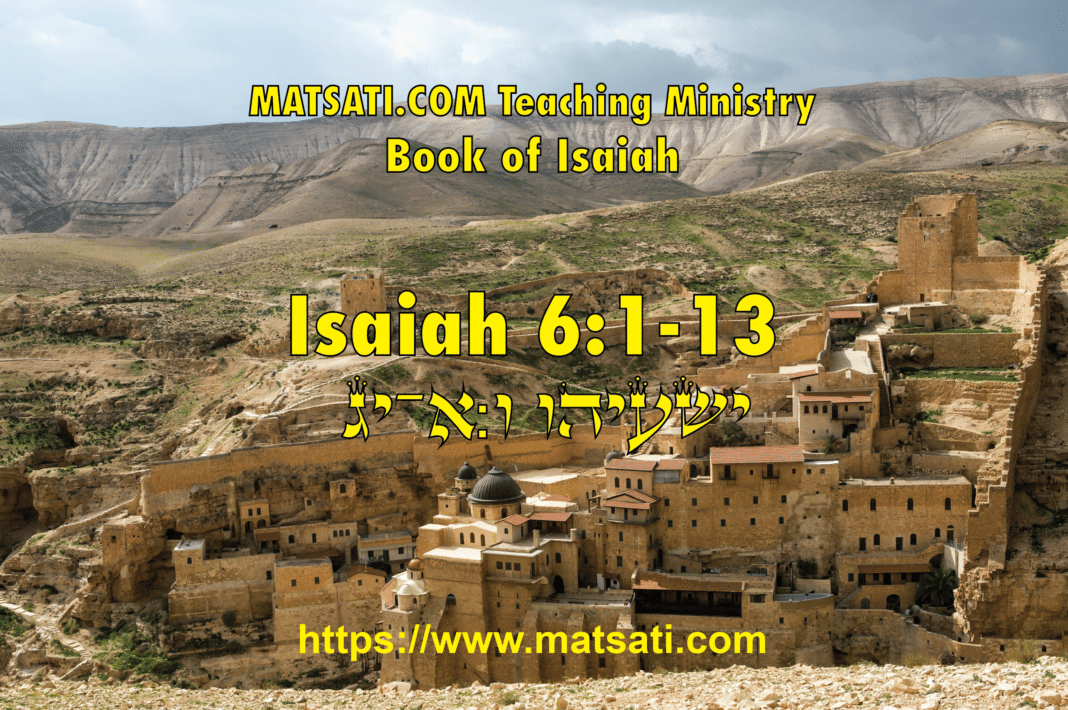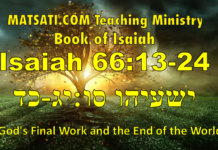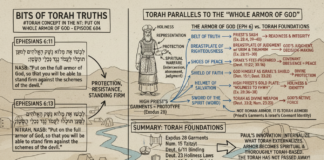Table of Contents
Introduction to Isaiah 6:1-13
Pretty much every Commentary on Isaiah has a problem with the way Isaiah introduces chapter 6. They say that the first verse presents a serious problem being written very similar to Isaiah 1:1. The approach to Isaiah 1-5 was to lay down the groundwork concerning the major issues for the entire purpose of God’s calling on Isaiah’s life, which was to go to a sinful people and call them to repentance. The exhortation of the people regarding their sins, their pride, their selfish wanton lusts, sexual sins, and idolatry, all have led to God having called Isaiah to go forth to the people and cry out to repent. The narrative in Isaiah 1-5 does not really present a problem in respect to chapter 6. The reasons Isaiah reiterated the year that king Uziah died was due to his needing to provide the people exactly when this vision and calling took place. The logical conclusion is Isaiah 1-5 happened in the same year as chapter 6. The timeline is not chronological at this point due to his being called and his prophetic message to the people according to Isaiah 1-5 appear to occur at the same time. This is likely why some commentators attempt to place chapters 1-5 somehow into chapter 6 or 7 etc. The question is asked in John Oswalt commentary on Isaiah “why was this vision and calling not placed first in the book?” The reason is due to the sins of the people far outweighing the calling itself. The point is that it doesn’t matter how great of a miracle performed or how magnificent the vision, these things will not elicit faith in the people. (Note that the unrighteous are always asking for a sign as proof, etc.) Therefore, the primacy is for the exhortation of the people to call them to repentance and bear the testimony of God before them as miracles and visions are not going to change their minds. History bares these things out to be true! This is a pretty simple concept that most commentaries seem to miss. Because most commentaries like John Oswalt miss this important concept the majority of commentaries argue the need to believe Isaiah was pieced together by different scrolls from a redactor or multiple redactors. This approach is a major problem to the authenticity and to having faith in the inspiration of God’s Word to Isaiah!
The point of what we have read thus far is that our focus in life should be upon the trustworthiness of God and believing that God is able to save those who will trust in Him! This is a theme that we see throughout all of Scripture, but also there is a connection here to those who trust in the nations as opposed to trusting in God. The Lord God of Israel promises to deliver us from the nations, protecting us, keeping us from harm, and the justice that is promised to the nations who reject the God of Israel and His holy ways! Israel was supposed to be a holy people of whom the nations would come to learn about God and His holy ways. (Isaiah 43:8-14, 49:5-6, Ezekiel 36:22-38) What we find being presented here in Isaiah 6 is that prior to this, Isaiah 1-5 lays out the groundwork for the sinfulness of the nation. Then Isaiah provides the imagery of the holiness of the Lord God Almighty. Isaiah follows the cycle that we read about in the Scriptures on sin and repentance. The destruction that was brought to Judah by the hand of Assyria was due to Ahaz’s refusal to listen to Isaiah (see Isaiah 6:11-12 and 8:6-8). We learn how the nation is destroyed (Isaiah 6:13, 10:33-34) and yet a remnant of people are left alive, but in the Land of Israel and in the diaspora, for the purpose of allowing them to realize that the Lord God Almighty is to be trusted. ( Isaiah 6:13 and 11:1-12) Isaiah’s experience with God in chapter 6, he is calling to the people in the hope that they realize or recognize the horror of their sins before the glory, holiness, righteousness, and majesty of God. Isaiah begins opening chapter 6 in the following way.
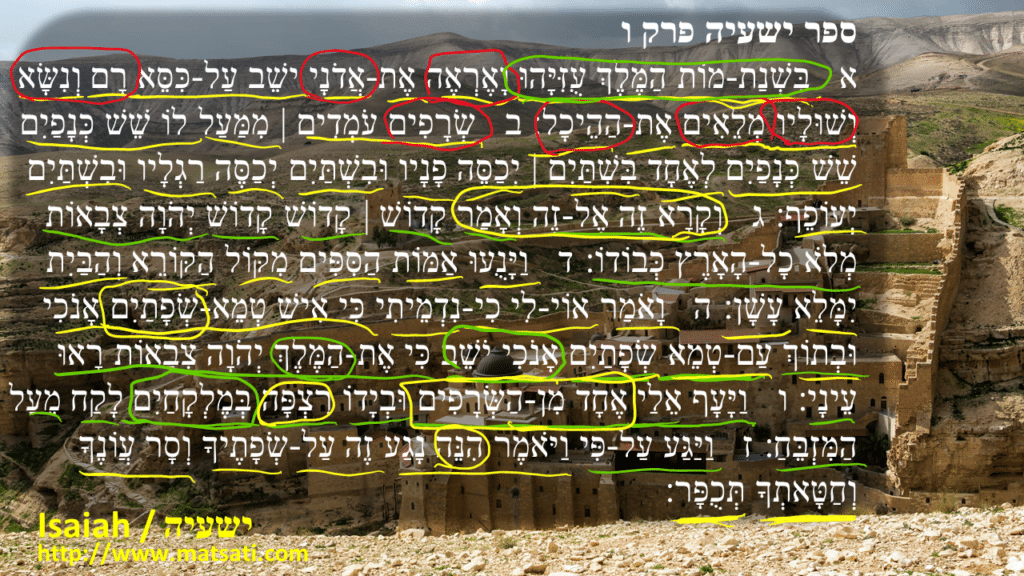
ספר ישעיה פרק ו
א בִּשְׁנַת-מוֹת הַמֶּלֶךְ עֻזִּיָּהוּ וָאֶרְאֶה אֶת-אֲדֹנָי ישֵׁב עַל-כִּסֵּא רָם וְנִשָּׂא וְשׁוּלָיו מְלֵאִים אֶת-הַהֵיכָל:
Isaiah 6:1 states, “In the year that king Uzziah died (בִּשְׁנַת-מוֹת הַמֶּלֶךְ עֻזִּיָּהוּ) I saw also the LORD sitting upon a throne, (וָאֶרְאֶה אֶת-אֲדֹנָי ישֵׁב עַל-כִּסֵּא) high and lifted up, (רָם וְנִשָּׂא) and his train filled the temple. (וְשׁוּלָיו מְלֵאִים אֶת-הַהֵיכָל)” Isaiah had previously revealed to the people their utter sinfulness and the Torah based reasons why this is so. Here Isaiah is being called into the service of God and literally sees the glory of God in heaven. This chapter provides the background necessary for the nation to realize their sins before the God of Israel. We note in a few verses Isaiah also believes himself to be unclean and sinful. This illustrates the truth, that all men are sinful and in need of the mercy and cleansing of God! We note something about the life of Uzziah. He took the throne when he was 16 years old. He ruled Judah for 52 years. These things speak to His righteousness before God as the long rule or reign of a king is illustrative of this. (His rule was not cut short due to his sinfulness like previous kings.) According to the Scriptures, he was a king that did right in God’s eyes. (2 Kings 15:3) The narrative in 2 Chronicles 26:5 tells us that as long as King Uzziah sought the Lord, God made him prosper. This reveals to us that when one has a relationship with God, one’s desire is for His (God’s) righteousness, and it drives us to do the right thing when relating with others. This also leads to one obeying the Mitzvot (Commands) of God which brings great success into the life of the believer. Success comes when one follows God’s direction and instruction for our lives. Remember, the Lord God told Joshua that the key to success and prosperity in life was obeying His Word (see Joshua 1:8). We are told that Uzziah did what was right in the eyes of the Lord, however, he didn’t remove the high places. This reveals to us a truth about allowing some sin into our lives, which led to a nation sinning against God. Remember in Isaiah 1-5 we are told about the corruption of the leadership which leads a people into sin. Proper leadership should lead people to the Lord and to His holy Word, where Yeshua is the example given to us according to the Scriptures. When serving God, we are to give Him 100% and not just 90% or some lesser amount. The reason being, the 10% is what allows the enemy some headway into our lives to deceive and wreak havoc upon our lives. This follows from king Uzziah, who was a good king for the people for the most part, and so the people trusted in Him. This may be another reason for the introductions of Isaiah 1:1 and 6:1, revealing that men die and so one’s trust is not in the king but in the God of Israel! Judah again had grown in every way, there was great prosperity according to 2 Chronicles 26:1-15. This is reason enough for Isaiah to explain to both Judah and Jerusalem that our trust is in the Lord and not man. When one places their trust in a person, what happens when that person dies? This is why it is all the more important to trust in what is eternal, the Lord God in heaven and His Messiah Yeshua. The Scriptures speak in various places on the holiness of God causing death according to Bereshit / Genesis 32:30, Shemot / Exodus 19:21, 20:19, 33:20, Devarim / Deuteronomy 18:16, and Judges 13:22. Here Isaiah saw God, he was permitted to see the Lord on High (וָאֶרְאֶה אֶת-אֲדֹנָי ישֵׁב עַל-כִּסֵּא). This idea of seeing God changes one’s life. Like Moshe as our example, the presence of God was empowering to do whatever it was that God had called him to do. The same is true for us today! These words רָם וְנִשָּׂא reveal the exaltation of God as being high and lifted up. The emphasis is upon his majesty, along with the glory described as וְשׁוּלָיו מְלֵאִים אֶת-הַהֵיכָל where the וְשׁוּלָיו the train of his robe, is an illustration of the majesty of a king, and we note how God’s train filled all of heaven, an analogy to the stars of heaven in the universe. The length of the train of God’s robe is the extent of his majesty, and the description as filling all of heaven is a testimony to that. Notice how the Torah is being drawn in here, specifically from Shemot / Exodus 24:10.
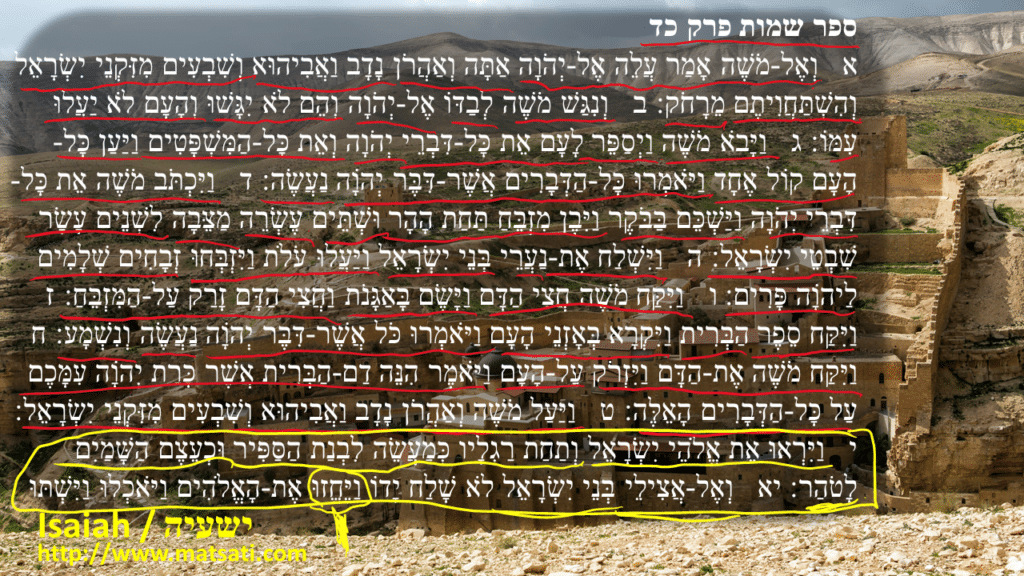
ספר שמות פרק כד
א וְאֶל-מֹשֶׁה אָמַר עֲלֵה אֶל-יְהֹוָה אַתָּה וְאַהֲרֹן נָדָב וַאֲבִיהוּא וְשִׁבְעִים מִזִּקְנֵי יִשְֹרָאֵל וְהִשְׁתַּחֲוִיתֶם מֵרָחֹק: ב וְנִגַּשׁ מֹשֶׁה לְבַדּוֹ אֶל-יְהֹוָה וְהֵם לֹא יִגָּשׁוּ וְהָעָם לֹא יַעֲלוּ עִמּוֹ: ג וַיָּבֹא מֹשֶׁה וַיְסַפֵּר לָעָם אֵת כָּל-דִּבְרֵי יְהֹוָה וְאֵת כָּל-הַמִּשְׁפָּטִים וַיַּעַן כָּל-הָעָם קוֹל אֶחָד וַיֹּאמְרוּ כָּל-הַדְּבָרִים אֲשֶׁר-דִּבֶּר יְהוָֹה נַעֲשֶֹה: ד וַיִּכְתֹּב מֹשֶׁה אֵת כָּל-דִּבְרֵי יְהֹוָה וַיַּשְׁכֵּם בַּבֹּקֶר וַיִּבֶן מִזְבֵּחַ תַּחַת הָהָר וּשְׁתֵּים עֶשְֹרֵה מַצֵּבָה לִשְׁנֵים עָשָֹר שִׁבְטֵי יִשְֹרָאֵל: ה וַיִּשְׁלַח אֶת-נַעֲרֵי בְּנֵי יִשְֹרָאֵל וַיַּעֲלוּ עֹלֹת וַיִּזְבְּחוּ זְבָחִים שְׁלָמִים לַיהוָֹה פָּרִים: ו וַיִּקַּח מֹשֶׁה חֲצִי הַדָּם וַיָּשֶֹם בָּאַגָּנֹת וַחֲצִי הַדָּם זָרַק עַל-הַמִּזְבֵּחַ: ז וַיִּקַּח סֵפֶר הַבְּרִית וַיִּקְרָא בְּאָזְנֵי הָעָם וַיֹּאמְרוּ כֹּל אֲשֶׁר-דִּבֶּר יְהוָֹה נַעֲשֶֹה וְנִשְׁמָע: ח וַיִּקַּח מֹשֶׁה אֶת-הַדָּם וַיִּזְרֹק עַל-הָעָם וַיֹּאמֶר הִנֵּה דַם-הַבְּרִית אֲשֶׁר כָּרַת יְהוָֹה עִמָּכֶם עַל כָּל-הַדְּבָרִים הָאֵלֶּה: ט וַיַּעַל מֹשֶׁה וְאַהֲרֹן נָדָב וַאֲבִיהוּא וְשִׁבְעִים מִזִּקְנֵי יִשְֹרָאֵל: י וַיִּרְאוּ אֵת אֱלֹהֵי יִשְֹרָאֵל וְתַחַת רַגְלָיו כְּמַעֲשֵֹה לִבְנַת הַסַּפִּיר וּכְעֶצֶם הַשָּׁמַיִם לָטֹהַר: יא וְאֶל-אֲצִילֵי בְּנֵי יִשְֹרָאֵל לֹא שָׁלַח יָדוֹ וַיֶּחֱזוּ אֶת-הָאֱלֹהִים וַיֹּאכְלוּ וַיִּשְׁתּוּ:
Shemot / Exodus 24:1-11
24:1 And he said unto Moses, Come up unto the LORD, thou, and Aaron, Nadab, and Abihu, and seventy of the elders of Israel; and worship ye afar off. 24:2 And Moses alone shall come near the LORD: but they shall not come nigh; neither shall the people go up with him. 24:3 And Moses came and told the people all the words of the LORD, and all the judgments: and all the people answered with one voice, and said, All the words which the LORD hath said will we do. 24:4 And Moses wrote all the words of the LORD, and rose up early in the morning, and builded an altar under the hill, and twelve pillars, according to the twelve tribes of Israel. 24:5 And he sent young men of the children of Israel, which offered burnt offerings, and sacrificed peace offerings of oxen unto the LORD. 24:6 And Moses took half of the blood, and put it in basons; and half of the blood he sprinkled on the altar. 24:7 And he took the book of the covenant, and read in the audience of the people: and they said, All that the LORD hath said will we do, and be obedient. 24:8 And Moses took the blood, and sprinkled it on the people, and said, Behold the blood of the covenant, which the LORD hath made with you concerning all these words. 24:9 Then went up Moses, and Aaron, Nadab, and Abihu, and seventy of the elders of Israel: 24:10 And they saw the God of Israel: and there was under his feet as it were a paved work of a sapphire stone, and as it were the body of heaven in his clearness. 24:11 And upon the nobles of the children of Israel he laid not his hand: also they saw God, and did eat and drink.
Here we are told how the elders of Israel, along with Moshe, Aaron, Nadav, and Avihu, all saw the Lord. (24:9) Notice how Isaiah was not the only one who was blessed to see God. Here the Torah describes what is under God’s feet, whereas Isaiah describes the train of God’s robe. These things could illustrate the foundation of truth in God’s Torah as referring to the foundation in the representation of God’s feet, and Isaiah focusing upon the glory, the majesty, the holiness of God, in light of the sins of the people. We note that in both cases God is exalted far above everything else. Whereas Isaiah is explaining how self-exaltation in pride is strictly opposing the truth and position that HaShem is to take in our lives. Isaiah continues with his vision saying the following:
ספר ישעיה פרק ו
ב שְֹרָפִים עֹמְדִים | מִמַּעַל לוֹ שֵׁשׁ כְּנָפַיִם שֵׁשׁ כְּנָפַיִם לְאֶחָד בִּשְׁתַּיִם | יְכַסֶּה פָנָיו וּבִשְׁתַּיִם יְכַסֶּה רַגְלָיו וּבִשְׁתַּיִם יְעוֹפֵף:
Isaiah 6:2 states, “Above it stood the seraphims: (שְֹרָפִים עֹמְדִים | מִמַּעַל לוֹ) each one had six wings; (שֵׁשׁ כְּנָפַיִם שֵׁשׁ כְּנָפַיִם לְאֶחָד) with twain he covered his face, (בִּשְׁתַּיִם | יְכַסֶּה פָנָיו) and with twain he covered his feet, (וּבִשְׁתַּיִם יְכַסֶּה רַגְלָיו) and with twain he did fly. (וּבִשְׁתַּיִם יְעוֹפֵף)” This is an amazing site, and parallels what we read according to Ezekiel chapter 1. Interesting point that John Oswalt draws out from Bamidbar / Numbers 21:6, Isaiah 14:29 and 30:6, here שָׂרָ֣ף in Isaiah is described as שָׂרָ֣ף מְעוֹפֵ֔ף the flying fiery serpent, and the connection to the root word for שְֹרָפִים Seraphim. There are some commentators who believe these were fiery dragons that were surrounding the Lord in Isaiah’s vision. It is more likely that Isaiah is drawing upon the Torah context of the wilderness journey and the complaining of the people according to Bamidbar / Numbers 21 in his references to fiery serpents in Isaiah 14:29 and 30:6. Note the grumbling and rebellion that resulted and the consequence of fiery serpents biting the people. Then Moshe had to make a seriph nakhash (fiery serpent) lifted upon a standard such that the people had to exercise their faith in order to be healed. All of these things tie into the common theme of trusting in God. These few examples given by the commentaries are not a sufficient proof text to suggest the angels were dragons (serpents). The point is the word שָׂרָ֣ף is an adjective in the Torah account to describe the nakhash (נחש) the serpent. HALOT lexicon describes this word in the following way:
שָׂרָף: MHeb. שָׂרָף; SamP. versions Dt 8:15 שרוף šårof; JArm. Nu 21:6 שרפיתה Dt 8:15 שרפין, Zech 3:7 det. סִרְפַיָּא: a type of serpent, Saraph serpent; the word could be an adj. or sbst. (Bauer-L. Heb. 462q and s) and may be related to I שׂרף, as the versions indeed suggest; accordingly שׂרף signifies the colour or burning pain of a bite: glowing, burning, or the glowing one, the burning one; for a linguistic explanation see e.g. Gesenius-B.; KBL; Zorell Lex.; König Wb. 472b; Keel Visionen 71: pl. שְׂרָפִים.
Koehler, L., Baumgartner, W., Richardson, M. E. J., & Stamm, J. J. (1994–2000). The Hebrew and Aramaic lexicon of the Old Testament (electronic ed., p. 1360). Leiden: E.J. Brill.
Therefore, we can’t dismiss the idea that the use of this word may be to describe these angels as fiery one’s. We also note how fire is also representative of God’s holiness (see Shemot / Exodus 3:1-6, 13:21, 19:18, Vayikra / Leviticus 10:1-2, Bamidbar / Numbers 11:1-2, 1 Kings 18:24, and Isaiah 6:6-7) therefore these beings may have had the appearance of fire, or the glow of such, etc.
ספר ישעיה פרק ו
ג וְקָרָא זֶה אֶל-זֶה וְאָמַר קָדוֹשׁ | קָדוֹשׁ קָדוֹשׁ יְהֹוָה צְבָאוֹת מְלֹא כָל-הָאָרֶץ כְּבוֹדוֹ:
Isaiah 6:3 states, “And one cried unto another, and said, (וְקָרָא זֶה אֶל-זֶה וְאָמַר) Holy, holy, holy, is the LORD of hosts: the whole earth is full of his glory. (קָדוֹשׁ | קָדוֹשׁ קָדוֹשׁ יְהֹוָה צְבָאוֹת מְלֹא כָל-הָאָרֶץ כְּבוֹדוֹ)” The statement וְקָרָא זֶה אֶל-זֶה וְאָמַר has the seraphim calling out to one another followed by קָדוֹשׁ | קָדוֹשׁ קָדוֹשׁ יְהֹוָה צְבָאוֹת מְלֹא כָל-הָאָרֶץ כְּבוֹדוֹ this seems to be a stanza in a song as if each set of angels were singing together concerning the holiness of God. (Tehillim / Psalms 145:11 לְהוֹדִ֤יעַ׀ לִבְנֵ֣י הָ֭אָדָם גְּבוּרֹתָ֑יו וּ֝כְב֗וֹד הֲדַ֣ר מַלְכוּתֽוֹ׃) We note this is the same thing occurring in the book or Revelation in chapter 4. Here the use of the word קָדוֹשׁ “holy” is repeated three times קָדוֹשׁ קָדוֹשׁ קָדוֹשׁ to emphasize the utter holiness of God. Both Isaiah and Revelation (Apostle John) are drawing upon the Torah concept of the holiness of God. The Torah exhorts the Israelites to be holy and tells them how to do so. The uniqueness of God’s people is to be safeguarded by the Mitzvot (Commandments) of God to set God’s people apart from the nations. We note that God tells us if sin reigns in our lives, unrepentant and no desire for faithfulness, the Land itself will spew you out just as we are seeing what is taking place here in Isaiah’s time. (see Vayikra / Leviticus 20:22-23) Does this suggest we simply have to have the proper behavior, and this will protect us? Absolutely not! The point is obedience to the commands is difficult, and especially difficult to maintain. This is why we need the Lord’s help, and the reason God sent His son Yeshua whereby our faith in Him we receive the power of God from on high to overcome the world just as Yeshua did via the Holy Spirit of God. Our weaknesses demonstrate how holiness is distinct among God’s people and God Himself.
It is important to note how holiness was not restricted to judao-christianity but the root for קדוש was also used to describe temple prostitution and specifically to women involved in Baal and Asherah worship. (Bereshit / Genesis 38:21: וַיִּשְׁאַ֞ל אֶת־אַנְשֵׁ֤י מְקֹמָהּ֙ לֵאמֹ֔ר אַיֵּ֧ה הַקְּדֵשָׁ֛ה הִ֥וא בָעֵינַ֖יִם עַל־הַדָּ֑רֶךְ וַיֹּ֣אמְר֔וּ לֹא־הָיְתָ֥ה בָזֶ֖ה קְדֵשָֽׁה׃, Hosea 4:14) These קְדֵשָֽׁה (women or men) would commit fornication and/or adultery or homosexuality with those who are involved in these religions. Holiness to the God of Israel was and is today related to ethical and moral behavior. The Torah describes this perspective: the entire nation was to be holy to God (Shemot / Exodus 19:6) We note how Isaiah announces the holiness of God here declaring that it is a holy God who created all that we know, He is the God of all Creation who is over the people and all of the world.
ספר ישעיה פרק ו
ד וַיָּנֻעוּ אַמּוֹת הַסִּפִּים מִקּוֹל הַקּוֹרֵא וְהַבַּיִת יִמָּלֵא עָשָׁן:
Isaiah 6:4 states, “And the posts of the door moved at the voice of him that cried, (וַיָּנֻעוּ אַמּוֹת הַסִּפִּים מִקּוֹל הַקּוֹרֵא) and the house was filled with smoke. (וְהַבַּיִת יִמָּלֵא עָשָׁן)” What we read here is the power of God’s word, as the magnitude of His glory, the voice of His word shook even heaven. If it is that God’s word is the foundation of all things, by which all things were created, then when the word goes forth, it is not surprising that the very foundation of heaven itself shakes as well. The way Isaiah speaks about these things provides us with the imagery of awesome power and realizing before whom Isaiah stands is the all-powerful one! Smoke filling the place draws in the Torah perspective of the Mishkhan (Tabernacle) in the wilderness, the incense, all of the elements of the experience at Sinai, etc. (see Shemot / Exodus 13:21, 14:19, 40:34, 1 Kings 8:10, Isaiah 4:5) These things remind us how the Lord God Almighty is not to be looked upon by those who are living in this world, as this would lead to immediate death, and again this draws in the Torah perspective on the smoke of this place represents the holiness and power of God!
ספר ישעיה פרק ו
ה וָאֹמַר אוֹי-לִי כִי-נִדְמֵיתִי כִּי אִישׁ טְמֵא-שְֹפָתַיִם אָנֹכִי וּבְתוֹךְ עַם-טְמֵא שְֹפָתַיִם אָנֹכִי יֹשֵׁב כִּי אֶת-הַמֶּלֶךְ יְהֹוָה צְבָאוֹת רָאוּ עֵינָי:
Isaiah 6:5 states, “Then said I, Woe is me! for I am undone; (וָאֹמַר אוֹי-לִי כִי-נִדְמֵיתִי) because I am a man of unclean lips, (כִּי אִישׁ טְמֵא-שְֹפָתַיִם) and I dwell in the midst of a people of unclean lips: (וּבְתוֹךְ עַם-טְמֵא שְֹפָתַיִם אָנֹכִי יֹשֵׁב) for mine eyes have seen the King, the LORD of hosts. (כִּי אֶת-הַמֶּלֶךְ יְהֹוָה צְבָאוֹת רָאוּ עֵינָי)” It is at this point having seen all of these things, that Isaiah immediately realizes the uncleanness of his own life, how short he comes to the glory of God, and the need for cleansing from God Himself. We note again how the people all were to be holy according to the Torah. Again, what we are reading here of man falling short of the glory of God does not mean we are not supposed to try and walk in God’s holy ways.
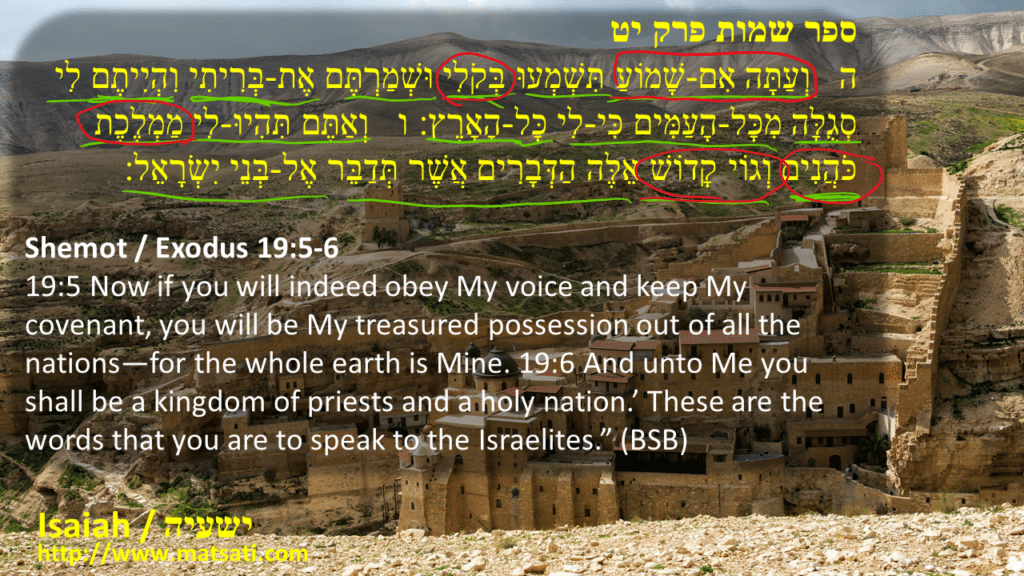
ספר שמות פרק יט
ה וְעַתָּה אִם-שָׁמוֹעַ תִּשְׁמְעוּ בְּקֹלִי וּשְׁמַרְתֶּם אֶת-בְּרִיתִי וִהְיִיתֶם לִי סְגֻלָּה מִכָּל-הָעַמִּים כִּי-לִי כָּל-הָאָרֶץ: ו וְאַתֶּם תִּהְיוּ-לִי מַמְלֶכֶת כֹּהֲנִים וְגוֹי קָדוֹשׁ אֵלֶּה הַדְּבָרִים אֲשֶׁר תְּדַבֵּר אֶל-בְּנֵי יִשְֹרָאֵל:
Shemot / Exodus 19:5-6
19:5 Now if you will indeed obey My voice and keep My covenant, you will be My treasured possession out of all the nations—for the whole earth is Mine. 19:6 And unto Me you shall be a kingdom of priests and a holy nation.’ These are the words that you are to speak to the Israelites.” (BSB)
The Torah describes God saying through Moshe, אִם-שָׁמוֹעַ תִּשְׁמְעוּ בְּקֹלִי “if you will listen to my voice” drawing in a direct parallel to the Isaiah text here. We note that all of the people will be a מַמְלֶכֶת כֹּהֲנִים וְגוֹי קָדוֹשׁ “kingdom of priests and holy nation.” This presentation of God by Isaiah following the previous exhortation about sin, should cause the people to also realize their condition before a holy God as being woefully inadequate! This should lead to despair and then repentance before God. It is the uncleanness of life that made Isaiah realize his need for the mercy of God. This is the primary point of the holiness of God in relation to the sinfulness of man. Isaiah says that his lips, and his life are unclean before a holy God! Based upon the definition of righteousness and holiness in the Torah, the pagans valued uncleanness as a positive attribute and devalued the word of the Living God, because the source of their doctrines is demonic. When we study the Scriptures, we realize that there is no such thing as “ritual uncleanness / impurity.” The Scriptures simply describe clean (טָהוֹר) and unclean (טמא) as that, not adding the word “ritual” this is something that has been added by man to help further quantify the meaning. This is important, as clean and unclean are not specifically related to ritual and the temple service and therefore have an application to all of mankind, not just Israel! Clean and unclean permeates all of our lives to the expression of our standing before God regardless of ritual. This is why faith is necessary for purification, why we need the Lord for our purification, as actions and obedience to the Torah alone are not enough. This is what Paul was arguing in Romans 10 and elsewhere. The seraphim continually give forth praise unto God. In context, the human heart does not continually do this and therefore Isaiah recognizes that he is a man of unclean lips, as we all are! The opening phrase to Isaiah 6, בִּשְׁנַת-מוֹת הַמֶּלֶךְ עֻזִּיָּהוּ draws into context king Uzziah’s death illustrating that it is not by man that salvation will come, or make a nation clean before God. It is only by the true King of Creation that we find mercy, salvation, and forgiveness.
ספר ישעיה פרק ו
ו וַיָּעָף אֵלַי אֶחָד מִן-הַשְּׂרָפִים וּבְיָדוֹ רִצְפָּה בְּמֶלְקָחַיִם לָקַח מֵעַל הַמִּזְבֵּחַ:
Isaiah 6:6 states, “Then flew one of the seraphims unto me, (וַיָּעָף אֵלַי אֶחָד מִן-הַשְּׂרָפִים) having a live coal in his hand, (וּבְיָדוֹ רִצְפָּה) which he had taken with the tongs from off the altar. (בְּמֶלְקָחַיִם לָקַח מֵעַל הַמִּזְבֵּחַ)” This verse speaks to the mercy of God on Isaiah. We notice that Isaiah did not plead for this cleansing, but simply recognized the truth of his standing before God! The Seraph comes וּבְיָדוֹ רִצְפָּה “with a live coal in his hand” to touch his lips and to cleanse so that he could go forth to proclaim the message that God is sending him to proclaim. We note that the Lord God Almighty does not reveal Himself to us for the purpose of destroying us, but to redeem us. This is what Yeshua taught us as having seen him we have seen the Father. (John 14:9) We note the only altar that we know of in heaven is that of the heavenly tabernacle that is described in Revelation 15:5. We note that it is blood that atones for sins, (Vayikra / Leviticus 16:14-19, 17:11, Matthew 26:28, Hebrews 9:22) and we also note in the Torah how the incense also atones according to Vayikra / Leviticus 16:12 and Bamidbar / Numbers 16:46-47. Here אֶחָד מִן-הַשְּׂרָפִים “one from the Seraphim” one of the fiery ones comes with the purification of God. Notice also that it is a burning coal that is cleansing Isaiah and the blood is not mentioned. Note that fire has the capability to destroy and cleans, as we read according to Bamidbar / Numbers 31:22-23, “Gold and silver, copper, iron, tin, and lead–any article that can withstand fire–these you shall pass through fire and they shall be clean, except that they must be cleansed with waters of lustration, and anything that cannot withstand fire you must pass through water.” We also read that God is a consuming fire (Devarim / Deuteronomy 4:24 and Isaiah 33:14) and that consuming consumes the unrighteous according to Tehillim / Psalms 50:3-23, Isaiah 33:13-15, Tehillim / Psalms 24:3-6, and Daniel 3. So it is by fire that God purifies Isaiah’s lips for service in ministry and prophecy.
ספר ישעיה פרק ו
ז וַיַּגַּע עַל-פִּי וַיֹּאמֶר הִנֵּה נָגַע זֶה עַל-שְֹפָתֶיךָ וְסָר עֲוֹנֶךָ וְחַטָּאתְךָ תְּכֻפָּר:
Isaiah 6:7 states, “And he laid it upon my mouth, (וַיַּגַּע עַל-פִּי) and said, Lo, this hath touched thy lips; (וַיֹּאמֶר הִנֵּה נָגַע זֶה עַל-שְֹפָתֶיךָ) and thine iniquity is taken away, and thy sin purged. (וְסָר עֲוֹנֶךָ וְחַטָּאתְךָ תְּכֻפָּר)” Here the רִצְפָּה “fiery coal” touches his lips and he is cleansed. From a Torah perspective, the Cohen would have the sinner place his hand upon the animal, and by faith sin would transfer to the animal. Then the priest would slaughter the animal, and place its meat upon the altar, and sprinkle the blood on the altar. Then the Cohen would eat from a portion of the sacrifice for the purpose of bearing the sin, and then go before God and make atonement on behalf of the sinner using the blood of the sacrifice. This is the Torah based process for atonement. Here, what happens to Isaiah is different from the sense that it is a coal from the altar that cleansed both his lips and purged away his sins.
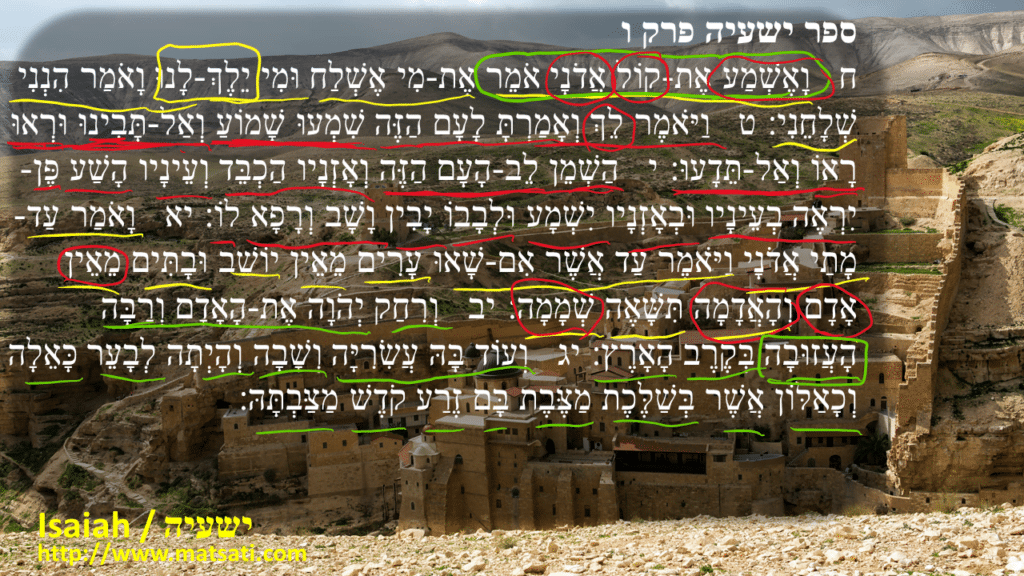
ספר ישעיה פרק ו
ח וָאֶשְׁמַע אֶת-קוֹל אֲדֹנָי אֹמֵר אֶת-מִי אֶשְׁלַח וּמִי יֵלֶךְ-לָנוּ וָאֹמַר הִנְנִי שְׁלָחֵנִי:
Isaiah 6:8 states, “Also I heard the voice of the Lord, saying, (וָאֶשְׁמַע אֶת-קוֹל אֲדֹנָי אֹמֵר) Whom shall I send, and who will go for us? (אֶת-מִי אֶשְׁלַח וּמִי יֵלֶךְ-לָנוּ) Then said I, Here am I; send me. (וָאֹמַר הִנְנִי שְׁלָחֵנִי)” This statement וָאֶשְׁמַע אֶת-קוֹל אֲדֹנָי אֹמֵר is the first time that Isaiah hears the voice of God speaking. It wasn’t until his cleansing had taken place that he was able to hear the voice of God. This is a very important principle that Isaiah is explaining here. We note something that the Apostle John wrote according to 1 John 1:7-10.
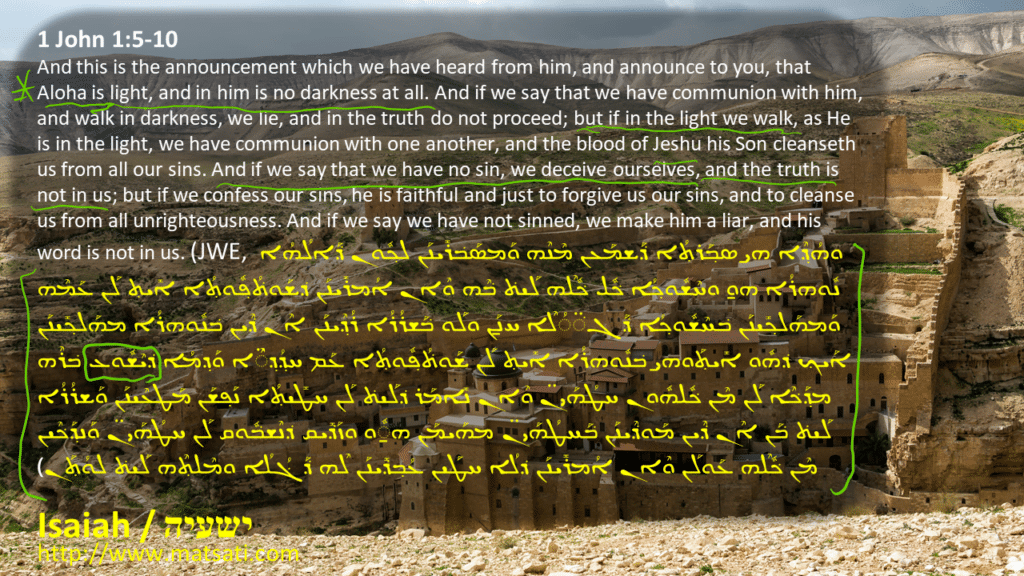
1 John 1:5-10
And this is the announcement which we have heard from him, and announce to you, that Aloha is light, and in him is no darkness at all. And if we say that we have communion with him, and walk in darkness, we lie, and in the truth do not proceed; but if in the light we walk, as He is in the light, we have communion with one another, and the blood of Jeshu his Son cleanseth us from all our sins. And if we say that we have no sin, we deceive ourselves, and the truth is not in us; but if we confess our sins, he is faithful and just to forgive us our sins, and to cleanse us from all unrighteousness. And if we say we have not sinned, we make him a liar, and his word is not in us. (JWE, ܘܗܳܕ݂ܶܐ ܗ̱ܝ ܣܒ݂ܰܪܬ݂ܳܐ ܕ݁ܰܫܡܰܥܢ ܡܶܢܶܗ ܘܰܡܣܰܒ݁ܪܺܝܢܰܢ ܠܟ݂ܽܘܢ ܕ݁ܰܐܠܳܗܳܐ ܢܽܘܗܪܳܐ ܗ̱ܘ ܘܚܶܫܽܘܟ݂ܳܐ ܟ݁ܽܠ ܟ݁ܽܠܶܗ ܠܰܝܬ݁ ܒ݁ܶܗ ܘܶܐܢ ܐܳܡܪܺܝܢܰܢ ܕ݁ܫܰܘܬ݁ܳܦ݂ܽܘܬ݂ܳܐ ܐܺܝܬ݂ ܠܰܢ ܥܰܡܶܗ ܘܰܡܗܰܠܟ݂ܺܝܢܰܢ ܒ݁ܚܶܫܽܘܟ݂ܳܐ ܕ݁ܰܓ̈݁ܳܠܶܐ ܚ̱ܢܰܢ ܘܠܰܘ ܒ݁ܰܫܪܳܪܳܐ ܪܳܕ݂ܶܝܢܰܢ ܐܶܢ ܕ݁ܶܝܢ ܒ݁ܢܽܘܗܪܳܐ ܡܗܰܠܟ݂ܺܝܢܰܢ ܐܰܝܟ݂ ܕ݁ܗܽܘ ܐܺܝܬ݂ܰܘܗ̱ܝ ܒ݁ܢܽܘܗܪܳܐ ܐܺܝܬ݂ ܠܰܢ ܫܰܘܬ݁ܳܦ݂ܽܘܬ݂ܳܐ ܥܰܡ ܚܕ݂ܳܕ݂̈ܶܐ ܘܰܕ݂ܡܳܐ ܕ݁ܝܶܫܽܘܥ ܒ݁ܪܶܗ ܡܕ݂ܰܟ݁ܶܐ ܠܰܢ ܡܶܢ ܟ݁ܽܠܗܽܘܢ ܚܛܳܗܰܝ̈ܢ ܘܶܐܢ ܢܺܐܡܰܪ ܕ݁ܠܰܝܬ݁ ܠܰܢ ܚܛܺܝܬ݂ܳܐ ܢܰܦ݂ܫܰܢ ܡܰܛܥܶܝܢܰܢ ܘܰܫܪܳܪܳܐ ܠܰܝܬ݁ ܒ݁ܰܢ ܐܶܢ ܕ݁ܶܝܢ ܡܰܘܕ݁ܶܝܢܰܢ ܒ݁ܰܚܛܳܗܰܝ̈ܢ ܡܗܰܝܡܰܢ ܗ̱ܽܘ ܘܙܰܕ݁ܺܝܩ ܕ݁ܢܶܫܒ݁ܽܘܩ ܠܰܢ ܚܛܳܗܰܝ̈ܢ ܘܰܢܕ݂ܰܟ݁ܶܝܢ ܡܶܢ ܟ݁ܽܠܶܗ ܥܰܘܠܰܢ ܘܶܐܢ ܐܳܡܪܺܝܢܰܢ ܕ݁ܠܳܐ ܚܛܰܝܢ ܥܳܒ݂ܕ݁ܺܝܢܰܢ ܠܶܗ ܕ݁ܰܓ݁ܳܠܳܐ ܘܡܶܠܬ݂ܶܗ ܠܰܝܬ݁ ܠܘܳܬ݂ܰܢ)
We note that God had sent Yeshua (ܝܶܫܽܘܥ) to cleanse us from our sins. It is only then that we are able to hear from God. There is a clear parallel here to what we are reading according to Isaiah. This verse in Isaiah 6:8 provides a proof text for our hearing from God if we remain in His Son Yeshua HaMashiakh! This is why we read that Isaiah now could hear the voice of God, having been cleansed and made pure. Now having been purified, Isaiah’s life is meant to serve God, and to live out the praise that God has done in his life, to bring glory to His name through faithfulness, truth, righteousness, and holiness. If these things do not follow, then the purification simply putrefies and turns rotten. This is the same situation that happens with those who have faith in Yeshua. When one encounters the Messiah believing upon him and receiving the Holy Spirit of God, if one does not act upon this gift from God, if one does not begin to learn to live faithfully before God, the sanctification and purification described here by John becomes putrefied and rotten, just as John writes, “And if we say that we have communion with him, and walk in darkness, we lie, and in the truth do not proceed.” We note that Isaiah volunteered, he was not coerced into volunteering. This is also an important point! When someone is coerced, their sincerity is not there, and the motivation is also not there. Sincerity and motivation of heart, kavanah is absolutely necessary in order to bring glory to God! We note how the death of a righteous king leads to the people looking towards God our Father in heaven. Is this not what Yeshua has done and illustrated for us according to the Apostolic Writings? We note that this leads to repentance, to seeking God, which then leads to cleansing and purification, and walking in God’s holy and righteous ways, turning from sin, and speaking of the mercy and glory of God in our lives! This is the pattern of faith and faithfulness in the lives of God’s people!
ספר ישעיה פרק ו
ט וַיֹּאמֶר לֵךְ וְאָמַרְתָּ לָעָם הַזֶּה שִׁמְעוּ שָׁמוֹעַ וְאַל-תָּבִינוּ וּרְאוּ רָאוֹ וְאַל-תֵּדָעוּ:
Isaiah 6:9 states, “And he said, Go, and tell this people, (וַיֹּאמֶר לֵךְ וְאָמַרְתָּ לָעָם הַזֶּה) Hear ye indeed, but understand not; and see ye indeed, but perceive not. (שִׁמְעוּ שָׁמוֹעַ וְאַל-תָּבִינוּ וּרְאוּ רָאוֹ וְאַל-תֵּדָעוּ)” This is the source text for Yeshua’s statements where he says on various occasions, מִי שֶׁאָזְנַיִם לוֹ, שֶׁיִּשְׁמַע “he who has ears to hear, let him hear” (Matthew 11:15) where Yeshua draws in both Isaiah and the Torah text to bear witness to the people of his generation. The idea is that these people are so hard of heart they cannot understand the truth even if it was presented to them explicitly. Note that it isn’t just the hearing, but the seeing is coupled to hearing. The point is that even if a miracle were performed, this would not elicit faith. All we have to do is look at the people of Israel in the wilderness, or the scribes and Pharisees in the days of Yeshua. Miracles only hardened their hearts. A miracle did not set a person free to believe! We also note that an unbeliever is always asking for or to see a miracle! We note from the Torah that to hear is synonymous with acknowledging and doing.
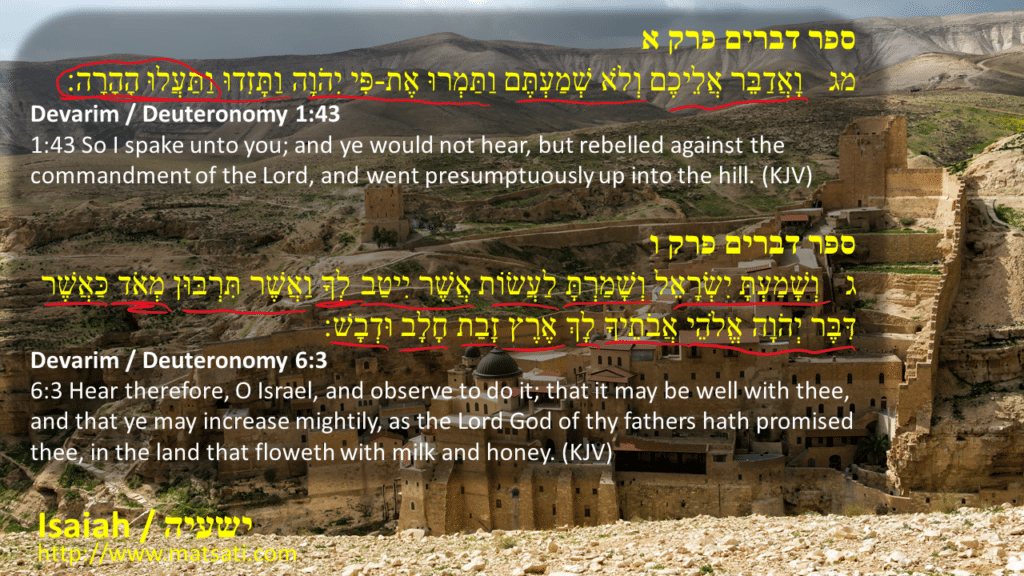
ספר דברים פרק א
מג וָאֲדַבֵּר אֲלֵיכֶם וְלֹא שְׁמַעְתֶּם וַתַּמְרוּ אֶת-פִּי יְהֹוָה וַתָּזִדוּ וַתַּעֲלוּ הָהָרָה:
Devarim / Deuteronomy 1:43
1:43 So I spake unto you; and ye would not hear, but rebelled against the commandment of the Lord, and went presumptuously up into the hill. (KJV)
ספר דברים פרק ו
ג וְשָׁמַעְתָּ יִשְֹרָאֵל וְשָׁמַרְתָּ לַעֲשֹוֹת אֲשֶׁר יִיטַב לְךָ וַאֲשֶׁר תִּרְבּוּן מְאֹד כַּאֲשֶׁר דִּבֶּר יְהֹוָה אֱלֹהֵי אֲבֹתֶיךָ לָךְ אֶרֶץ זָבַת חָלָב וּדְבָשׁ:
Devarim / Deuteronomy 6:3
6:3 Hear therefore, O Israel, and observe to do it; that it may be well with thee, and that ye may increase mightily, as the Lord God of thy fathers hath promised thee, in the land that floweth with milk and honey. (KJV)
Here God is revealing to Isaiah the rebellious nature of the people as being unwilling to listen and obey. This is the disease of pride in the lives of all peoples which leads to rebellion and ultimately destruction. This is reminiscent of Paul’s words according to 2 Timothy 3:7 Ever learning, and never able to come to the knowledge of the truth. (KJV) The source of their error is deep within where literally the Lord God Himself is only able to effect a change!
ספר ישעיה פרק ו
י הַשְׁמֵן לֵב-הָעָם הַזֶּה וְאָזְנָיו הַכְבֵּד וְעֵינָיו הָשַׁע פֶּן-יִרְאֶה בְעֵינָיו וּבְאָזְנָיו יִשְׁמָע וּלְבָבוֹ יָבִין וָשָׁב וְרָפָא לוֹ:
Isaiah 6:10 states, “Make the heart of this people fat, (הַשְׁמֵן לֵב-הָעָם הַזֶּה) and make their ears heavy, (וְאָזְנָיו הַכְבֵּד) and shut their eyes; (וְעֵינָיו הָשַׁע) lest they see with their eyes, and hear with their ears, and understand with their heart, and convert, and be healed. (פֶּן-יִרְאֶה בְעֵינָיו וּבְאָזְנָיו יִשְׁמָע וּלְבָבוֹ יָבִין וָשָׁב וְרָפָא לוֹ)” We note the issue here is that the people have sinned for so long, there is no hope for their turning, believing, and walking in God’s ways. When there is no hope, their ultimate outcome is destruction. This is how Paul understands the ideas of those who are made for destruction as opposed to those who are made for righteousness. (Romans 9:22) This isn’t a matter of Calvinism, but of the heart of a man who is unwilling to turn from his sinful ways, such a person is destined for destruction. Such a person is in whom God will demonstrate his wrath. Literally, the one who has gotten to a state of no return, his faculties of perception and response (the eyes, ears, and heart) will be so dulled down, it will be impossible to understand the truth. This is a description of the adamant refusal to listen to the words of the Lord. This generation of people who mingled their worship of the Almighty God with the worship of false deities. Their perversion of the truth, their syncretism, has led to their destruction, such that the words of the Torah will come true for those who practice such things. This was Isaiah’s calling to speak to a people who are utterly lost and doing so not being successful to turn these people their path to destruction. Ultimately this is the role of a preacher, to speak forth God’s holy Words, and that is the limit or extent that we are able to do. Only God is able to call the lost soul to repentance and ultimately to faith in Yeshua the Messiah!
ספר ישעיה פרק ו
יא וָאֹמַר עַד-מָתַי אֲדֹנָי וַיֹּאמֶר עַד אֲשֶׁר אִם-שָׁאוּ עָרִים מֵאֵין יוֹשֵׁב וּבָתִּים מֵאֵין אָדָם וְהָאֲדָמָה תִּשָּׁאֶה שְׁמָמָה: יב וְרִחַק יְהֹוָה אֶת-הָאָדָם וְרַבָּה הָעֲזוּבָה בְּקֶרֶב הָאָרֶץ:
Isaiah 6:11 states, “Then said I, Lord, how long? (וָאֹמַר עַד-מָתַי אֲדֹנָי) And he answered, Until the cities be wasted without inhabitant, (וַיֹּאמֶר עַד אֲשֶׁר אִם-שָׁאוּ עָרִים מֵאֵין יוֹשֵׁב) and the houses without man, and the land be utterly desolate, (וּבָתִּים מֵאֵין אָדָם וְהָאֲדָמָה תִּשָּׁאֶה שְׁמָמָה)” Isaiah 6:12 “And the LORD have removed men far away, (וְרִחַק יְהֹוָה אֶת-הָאָדָם) and there be a great forsaking in the midst of the land. (וְרַבָּה הָעֲזוּבָה בְּקֶרֶב הָאָרֶץ)” We note that the length of time of Isaiah’s ministry is to be until the destruction of the cities of Judah and Jerusalem according to Isaiah 6:11. This will be accomplished when the Lord removes men from the Land. The Land will be שְׁמָמָה (desolate), a description of being empty. This is so the Torah comes true according to the following scripture.
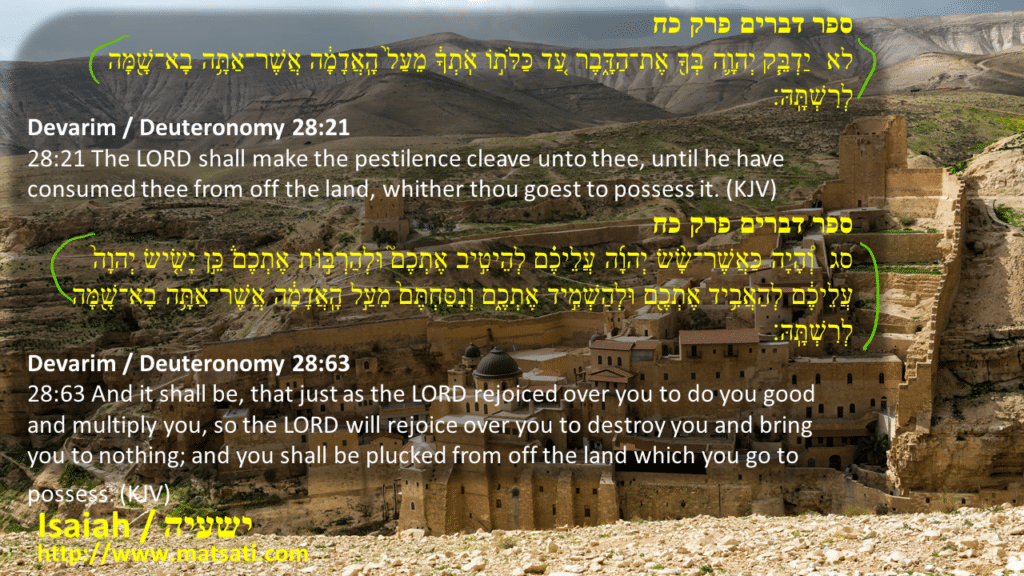
ספר דברים פרק כח
לא יַדְבֵּ֧ק יְהוָ֛ה בְּךָ֖ אֶת־הַדָּ֑בֶר עַ֚ד כַּלֹּת֣וֹ אֹֽתְךָ֔ מֵעַל֙ הָֽאֲדָמָ֔ה אֲשֶׁר־אַתָּ֥ה בָא־שָׁ֖מָּה לְרִשְׁתָּֽהּ׃
Devarim / Deuteronomy 28:21
28:21 The LORD shall make the pestilence cleave unto thee, until he have consumed thee from off the land, whither thou goest to possess it. (KJV)
ספר דברים פרק כח
סג וְ֠הָיָה כַּאֲשֶׁר־שָׂ֨שׂ יְהוָ֜ה עֲלֵיכֶ֗ם לְהֵיטִ֣יב אֶתְכֶם֮ וּלְהַרְבּ֣וֹת אֶתְכֶם֒ כֵּ֣ן יָשִׂ֤ישׂ יְהוָה֙ עֲלֵיכֶ֔ם לְהַאֲבִ֥יד אֶתְכֶ֖ם וּלְהַשְׁמִ֣יד אֶתְכֶ֑ם וְנִסַּחְתֶּם֙ מֵעַ֣ל הָֽאֲדָמָ֔ה אֲשֶׁר־אַתָּ֥ה בָא־שָׁ֖מָּה לְרִשְׁתָּֽהּ׃
Devarim / Deuteronomy 28:63
28:63 And it shall be, that just as the LORD rejoiced over you to do you good and multiply you, so the LORD will rejoice over you to destroy you and bring you to nothing; and you shall be plucked from off the land which you go to possess. (KJV)
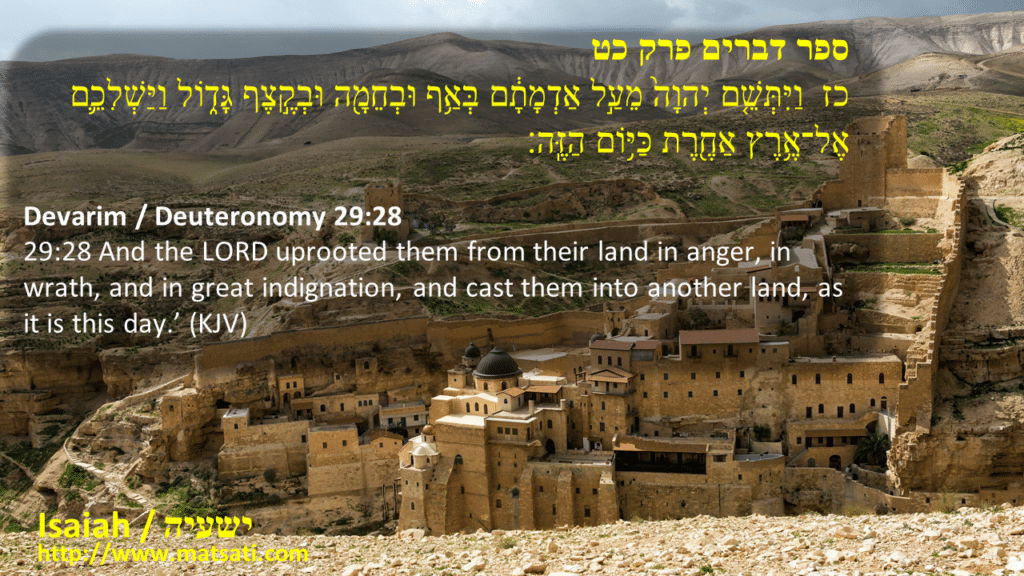
ספר דברים פרק כט
וַיִּתְּשֵׁ֤ם יְהוָה֙ מֵעַ֣ל אַדְמָתָ֔ם בְּאַ֥ף וּבְחֵמָ֖ה וּבְקֶ֣צֶף גָּד֑וֹל וַיַּשְׁלִכֵ֛ם אֶל־אֶ֥רֶץ אַחֶ֖רֶת כַּיּ֥וֹם הַזֶּֽה׃
Devarim / Deuteronomy 29:28
29:28 And the LORD uprooted them from their land in anger, in wrath, and in great indignation, and cast them into another land, as it is this day.’ (KJV)
The Torah warns what will happen if the people turn from the Lord. Notice that according to John Oswalt, the people had to remain in God’s favor by keeping His commands and so earning their place in this world and the Land. This is obviously a false understanding as the people are called to remain faithful to God just as we are called to remain faithful in Yeshua. This is about the people seeking the Lord, and His working in their lives. If the people walked away from God, this is what it means to be unfaithful and reaping the consequences of their choices. We note that this is what John is talking about in 1 John 1:5-10, if we walk in darkness there is no fellowship with Yeshua. Note the conditions are the same as we see here for the people concerning the Torah as John says, “but if in the light we walk, as He is in the light, we have communion with one another, and the blood of Yeshua his Son cleanseth us from all our sins. And if we say that we have no sin, we deceive ourselves, and the truth is not in us; but if we confess our sins, he is faithful and just to forgive us our sins, and to cleanse us from all unrighteousness.” Notice how faithfulness is coupled to the Torah command. If the people ceased to live faithfully to God, the land would vomit them out as it had the Canaanites before them (Vayikra / Leviticus 18:25-27).
ספר ישעיה פרק ו
יג וְעוֹד בָּהּ עֲשִֹרִיָּה וְשָׁבָה וְהָיְתָה לְבָעֵר כָּאֵלָה וְכָאַלּוֹן אֲשֶׁר בְּשַׁלֶּכֶת מַצֶּבֶת בָּם זֶרַע קֹדֶשׁ מַצַּבְתָּהּ:
Isaiah 6:13 states, “But yet in it shall be a tenth, and it shall return, (וְעוֹד בָּהּ עֲשִֹרִיָּה וְשָׁבָה) and shall be eaten: (וְהָיְתָה לְבָעֵר) as a teil tree, and as an oak, whose substance is in them, when they cast their leaves: so the holy seed shall be the substance thereof. (כָּאֵלָה וְכָאַלּוֹן אֲשֶׁר בְּשַׁלֶּכֶת מַצֶּבֶת בָּם זֶרַע קֹדֶשׁ מַצַּבְתָּהּ)” We note that Isaiah speaks prophetically concerning the Land, that not all of the people will be destroyed but a tenth will remain, and the Land will be filled again with their offspring. Their offspring will be holy unto the Lord because the Lord has a covenant and a promise to Israel that won’t be broken. This draws us back to the Torah and Parashat Lech Lecha, specifically Bereshit / Genesis 12:1-5, God’s promise to bless the nations through his offspring!
Rabbinic Literature on Isaiah 6:1-13
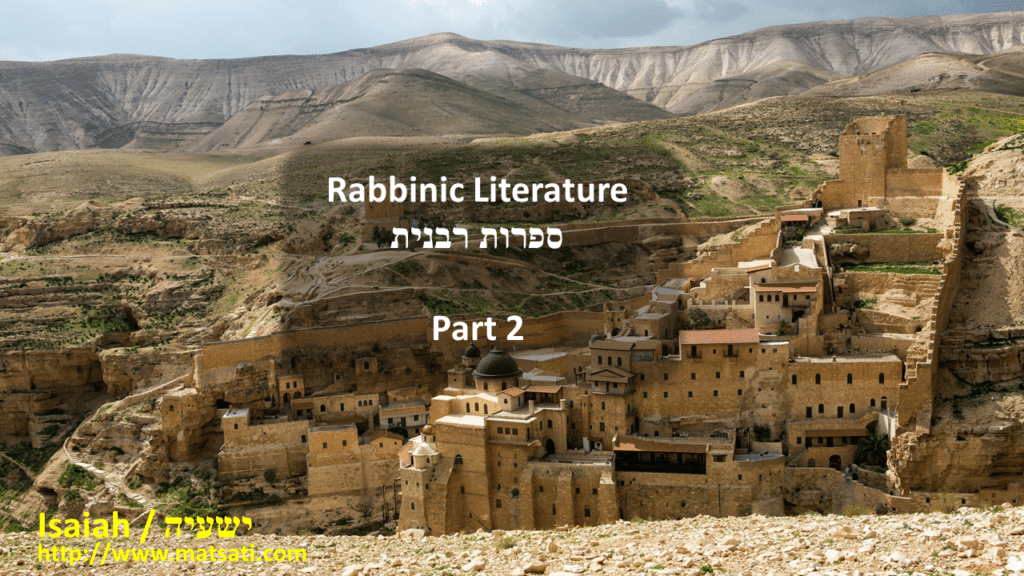
The Targum Jonathan is a rabbinic interpretation of the book of Isaiah. Jonathan interprets Isaiah in the following way:
תרגום יונתן בן עוזיאל אל ישעיה פרק ו:א-יג
א בְשַתָא דְאִתנַגַע בַה מַלכָא עוּזִיָה אְמַר נְבִיָא חְזֵיתִי יָת יְקָרָא דַיוי שְרֵי עְל כוּרסֵי רָם וּמנַטַל בִשמֵי מְרֹומָא וּמִזִיו יְקָרֵיה אִתמְלִי הֵיכְלָא׃ ב שַמָשִין קַדִישִין בְרוּמָא קֳדָמֹוהִי שִיתָא גַפִין שִיתָא גַפִין לְחַד בִתרֵין מְכַסֵי אַפֹוהִי דִילָא חָזֵי וּבִתרֵין מְכַסֵי גִויָתֵיה דִילָא מִתַחזֵי וּבִתרֵין מְשַמֵיש׃ ג וּמקַבְלִין דֵין מִדֵין וְאָמְרִין קַדִיש בִשמֵי מְרֹומָא † בֵית שְכִינְתֵיה קַדִיש עַל אַרעָא עֹובָד גְבוּרְתֵיה קַדִיש בְעָלַם עָלְמַיָא יוי ”צְבָאֹות“ מַליָא כָל אַרעָא זִיו יְקָרֵיה׃ ד וְזָעוּ אִלְוָת סִיפֵי הֵיכְלָא מִקָל מִלוּלָא וּבֵית מַקדְשָא אִתמְלִי אְמִיטְתָא׃ ה וַאְמַרִית וָי לִי אְרֵי חַבִית אְרֵי גְבַר חַייָב לְאֹוכָחָא אְנָא וּבגֹו עַמָא דִמגָעַל בְחֹובִין אְנָא יָתֵיב אְרֵי יָת יְקַר שְכִינַת מַלַך עָלְמַיָא יוי ”צְבָאֹות“ חְזַאָה עֵינָי׃ ו וְאִשתְוֵי לְוָתִי חַד מִן שַמָשַיָא וּבפוּמֵיה מַמלַל דְקַבֵיל מִן קֳדָם דִשכִינְתֵיה עַל כוּרסֵי יְקָרָא בִשמֵי מְרֹומָא עֵיל מִן מַדבְחָא׃ ז וְסַדַר בְפוּמִי וַאְמַר הָא שַוִיתִי פִתגָמֵי נְבוּאְתִי בְפוּמָך וְיִעדֹון חֹובָך וּחטָאָך יִתכַפְרוּן׃ ח וּשמַעִית יָת קָל מֵימְרָא דַיוי דְאָמַר יָת מַן אַשלַח לְאִתנַבָאָה וּמַן יֵיזֵיל לְאַלָפָא וַאְמַרִית הָאְנָא שְלַח יָתִי׃ ט וַאְמַר אִיזֵיל וְתֵימַר לְעַמָא הָדֵין דְשָמְעִין מִשמָע וְלָא מִסתַכְלִין וְחָזַן מִחזָא וְלָא יָדְעִין׃ י טַפֵיש לִבֵיה דְעַמָא הָדֵין וְאוּדנֹוהִי יַקַר וְעֵינֹוהִי טַמטֵים דִלמָא יִחזֹון בְעֵינֵיהֹון וּבאוּדנְהֹון יִשמְעוּן וּבלִיבְהֹון יִסתַכְלוּן וִיתוּבוּן וְיִשתְבֵיק לְהֹון׃ יא וַאְמַרִית עַד אִימַתִי יוי וַאְמַר עַד דִיצַדְייָן קִרוַיָא מִבְלִי יָתִיב וּבָתַיָא מִבְלִי אְנָשָא וְאַרעָא תִחרוּב וְתִצדֵי׃ יב וִירַחֵיק יוי יָת בְנֵי אְנָשָא וְתִסגֵי צַדיוּתָא בְגַוַה דְאַרעָא׃ יג וְיִשתַאְרוּן בַה חַד מִן עַסרָא צדיקיא וִיתוּבוּן וִיהֹון לְצָרָבָא כְבוּטמָא וּכבַלוּטָא דִבמִיתַר טַרפֵיהֹון דָמַן לְיַבִישִין וְעַד כְעַן אִינוּן רַטִיבִין לְקַייָמָא מִינְהֹון זַרעָא כֵין גָלְוָותָא דְיִשׂרָאֵל יִתכַנשוּן וִיתוּבוּן לַאְרַעהֹון אְרֵי זַרעָא דְקוּדשָא נִצבָתְהֹון׃
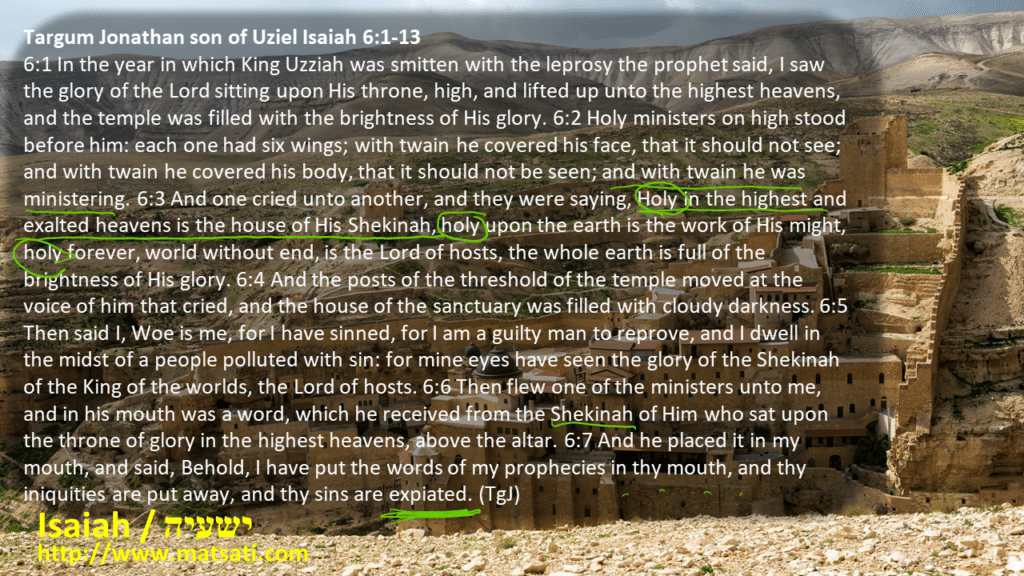
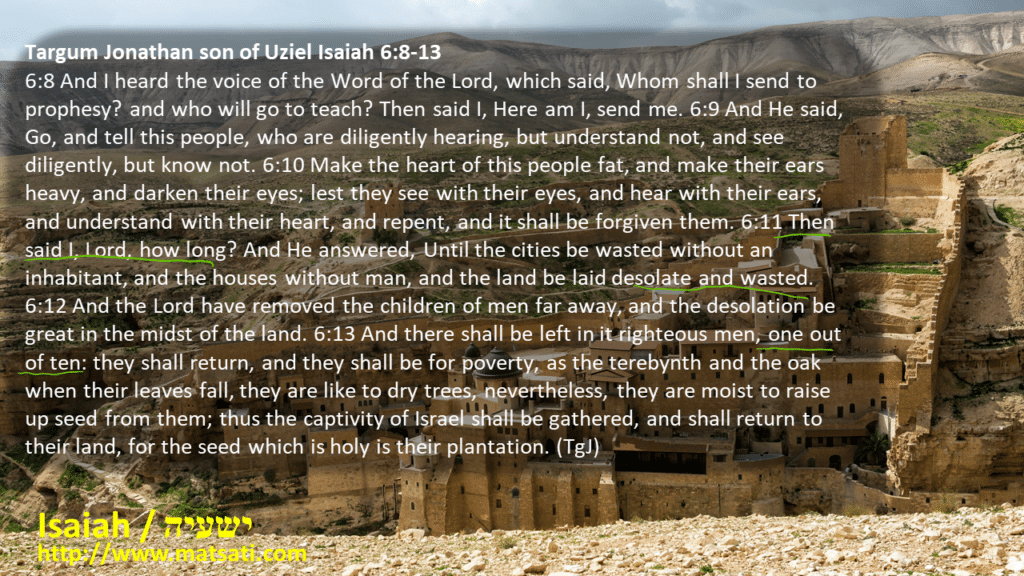
Targum Jonathan son of Uziel Isaiah 6:1-13
6:1 In the year in which King Uzziah was smitten with the leprosy the prophet said, I saw the glory of the Lord sitting upon His throne, high, and lifted up unto the highest heavens, and the temple was filled with the brightness of His glory. 6:2 Holy ministers on high stood before him: each one had six wings; with twain he covered his face, that it should not see; and with twain he covered his body, that it should not be seen; and with twain he was ministering. 6:3 And one cried unto another, and they were saying, Holy in the highest and exalted heavens is the house of His Shekinah, holy upon the earth is the work of His might, holy forever, world without end, is the Lord of hosts, the whole earth is full of the brightness of His glory. 6:4 And the posts of the threshold of the temple moved at the voice of him that cried, and the house of the sanctuary was filled with cloudy darkness. 6:5 Then said I, Woe is me, for I have sinned, for I am a guilty man to reprove, and I dwell in the midst of a people polluted with sin: for mine eyes have seen the glory of the Shekinah of the King of the worlds, the Lord of hosts. 6:6 Then flew one of the ministers unto me, and in his mouth was a word, which he received from the Shekinah of Him who sat upon the throne of glory in the highest heavens, above the altar. 6:7 And he placed it in my mouth, and said, Behold, I have put the words of my prophecies in thy mouth, and thy iniquities are put away, and thy sins are expiated. 6:8 And I heard the voice of the Word of the Lord, which said, Whom shall I send to prophesy? and who will go to teach? Then said I, Here am I, send me. 6:9 And He said, Go, and tell this people, who are diligently hearing, but understand not, and see diligently, but know not. 6:10 Make the heart of this people fat, and make their ears heavy, and darken their eyes; lest they see with their eyes, and hear with their ears, and understand with their heart, and repent, and it shall be forgiven them. 6:11 Then said I, Lord, how long? And He answered, Until the cities be wasted without an inhabitant, and the houses without man, and the land be laid desolate and wasted. 6:12 And the Lord have removed the children of men far away, and the desolation be great in the midst of the land. 6:13 And there shall be left in it righteous men, one out of ten: they shall return, and they shall be for poverty, as the terebynth and the oak when their leaves fall, they are like to dry trees, nevertheless, they are moist to raise up seed from them; thus the captivity of Israel shall be gathered, and shall return to their land, for the seed which is holy is their plantation. (TgJ)
TgJ interprets Isaiah speaking of the time at which Uzziah disobeyed the Torah, went before God to offer incense, and broke out in leprosy. The interpretation is that this is the time at which Uzziah died by literally having death showing up in his body. Based upon the Rabbinic interpretation, this places the time frame at a different time from the actual death of Uzziah. This however does cause this portion of the text to precede that of Isaiah 1:1. The Targum interpretation on the opening words in Isaiah 6:1 does not resolve the issues the commentators have concerning this opening passage to chapter 6 as being a repeat of Isaiah 1:1. The text states, א בְשַתָא דְאִתנַגַע בַה מַלכָא עוּזִיָה אְמַר נְבִיָא חְזֵיתִי יָת יְקָרָא דַיוי שְרֵי עְל כוּרסֵי רָם וּמנַטַל בִשמֵי מְרֹומָא וּמִזִיו יְקָרֵיה אִתמְלִי הֵיכְלָא׃ 6:1 In the year in which King Uzziah was smitten with the leprosy the prophet said, I saw the glory of the Lord sitting upon His throne, high, and lifted up unto the highest heavens, and the temple was filled with the brightness of His glory. (TgJ) Ibn Ezra states the following concerning this verse.
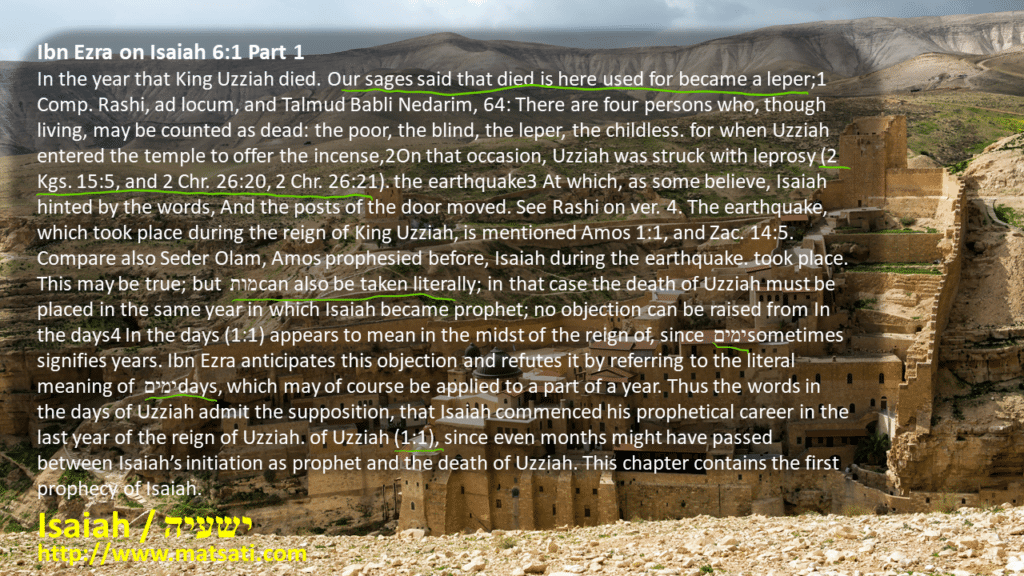
Ibn Ezra on Isaiah 6:1 Part 1
In the year that King Uzziah died. Our sages said that died is here used for became a leper;1 Comp. Rashi, ad locum, and Talmud Babli Nedarim, 64: There are four persons who, though living, may be counted as dead: the poor, the blind, the leper, the childless. for when Uzziah entered the temple to offer the incense,2On that occasion, Uzziah was struck with leprosy (2 Kgs. 15:5, and 2 Chr. 26:20, 2 Chr. 26:21). the earthquake3 At which, as some believe, Isaiah hinted by the words, And the posts of the door moved. See Rashi on ver. 4. The earthquake, which took place during the reign of King Uzziah, is mentioned Amos 1:1, and Zac. 14:5. Compare also Seder Olam, Amos prophesied before, Isaiah during the earthquake. took place. This may be true; but מות can also be taken literally; in that case the death of Uzziah must be placed in the same year in which Isaiah became prophet; no objection can be raised from In the days4 In the days (1:1) appears to mean in the midst of the reign of, since ימים sometimes signifies years. Ibn Ezra anticipates this objection and refutes it by referring to the literal meaning of ימים days, which may of course be applied to a part of a year. Thus the words in the days of Uzziah admit the supposition, that Isaiah commenced his prophetical career in the last year of the reign of Uzziah. of Uzziah (1:1), since even months might have passed between Isaiah’s initiation as prophet and the death of Uzziah. This chapter contains the first prophecy of Isaiah.
Here Ibn Ezra reiterates the TgJ interpretation with additional Talmudic references as a reference point for the interpretation. The Talmud Bavli Nedarim 64 speaks about 4 persons who are living but are counted as being dead. (i) the poor, (ii) the blind, (iii) the leper, and (iv) the childless. This is an interesting interpretation grouping these together, as each type of person seems to lack a blessing from God in one way or another. We note that a childless one may not necessarily be blind or poor, so there is a certain aspect that Ibn Ezra is drawing out, which is when one is not able to fulfill a command, he loses a great blessing in his life! Ibn Ezra speaks concerning the same issues with the opening words on the death of king Uzziah. He believes that Isaiah started his prophetic ministry in the year that Uzziah died, but yet months may have transpired following the inauguration. In addition, Ibn Ezra states that this is the first of the prophecies of Isaiah, again adding credence to others and commentaries struggling with the organization of this book in the opening chapters. Isaiah continues according to the TgJ saying, ב שַמָשִין קַדִישִין בְרוּמָא קֳדָמֹוהִי שִיתָא גַפִין שִיתָא גַפִין לְחַד בִתרֵין מְכַסֵי אַפֹוהִי דִילָא חָזֵי וּבִתרֵין מְכַסֵי גִויָתֵיה דִילָא מִתַחזֵי וּבִתרֵין מְשַמֵיש׃ 6:2 Holy ministers on high stood before him: each one had six wings; with twain he covered his face, that it should not see; and with twain he covered his body, that it should not be seen; and with twain he was ministering. ג וּמקַבְלִין דֵין מִדֵין וְאָמְרִין קַדִיש בִשמֵי מְרֹומָא † בֵית שְכִינְתֵיה קַדִיש עַל אַרעָא עֹובָד גְבוּרְתֵיה קַדִיש בְעָלַם עָלְמַיָא יוי ”צְבָאֹות“ מַליָא כָל אַרעָא זִיו יְקָרֵיה׃ 6:3 And one cried unto another, and they were saying, Holy in the highest and exalted heavens is the house of His Shekinah, holy upon the earth is the work of His might, holy forever, world without end, is the Lord of hosts, the whole earth is full of the brightness of His glory. (TgJ) The vision of Isaiah provides us an image of heaven and the total other worldliness of the holiness of God and His glory. Avot D’Rabbi Natan 12:6 interprets these things in the following way.
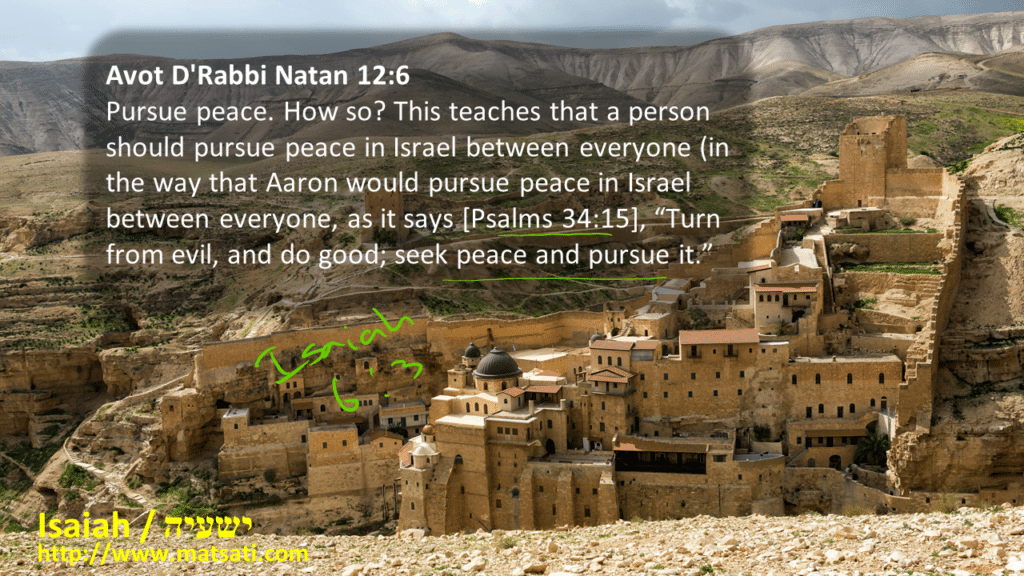
Avot D’Rabbi Natan 12:6
Pursue peace. How so? This teaches that a person should pursue peace in Israel between everyone (in the way that Aaron would pursue peace in Israel between everyone, as it says [Psalms 34:15], “Turn from evil, and do good; seek peace and pursue it.”
The rabbis go on to discuss this idea of pursuing peace. It’s questioned how one can pursue peace if a person stays quietly in his place? The conclusion is he must go out from his place and into the world. The Talmud concludes that this works only by seeking peace where you are and pursuing it in other places as well, meaning that no matter where we are we are to seek peace. The Talmud provides a Midrashic example from the Lord God Almighty Himself saying:
“Even the Holy Blessed One made peace in the heights, for He did not call ten angels Gabriel, ten angels Michael, ten angels Uriel, and ten angels Raphael, in the way humans do, calling ten people Reuben, ten people Shimon, ten people Levi, and ten people Judah. For if He had done as humans do, when He called one of them, they all would have come, and then become jealous of one another. So instead, He called only one angel Gabriel and one Michael, and when He calls any one of them, [that angel] comes before Him, and He dispatches the angel wherever He desires. And how do we know that they revere one another, and respect one another, and are humbler than human beings? Because when they open their mouths to sing a song, one of them says to the other: You should begin, for you are greater than I, and then the other one says: No, you should begin, for you are greater than I. This is not the way it is with human beings. Every person says to another: I am greater than you, and the other person responds: No, I am greater than you.”
Avot D’Rabbi Natan 12:6
The rabbis compare how the Lord names angels, he does so by giving a unique name to each angel, this so that peace is preserved in heaven. Each angel was humble offering the other opportunity to begin in praise of the glory of God. Note also the servant attitude of the angels. Man does not do this however due to pride, the characteristic of human behavior is completely opposite of this, and hence the need for our being given God’s Torah for instruction in our lives. This idea of pursuing peace reminds us of the Torah and specifically Sihon, King of Amora. Remember how Israel offered peace to Sihon, king of the Amorites.
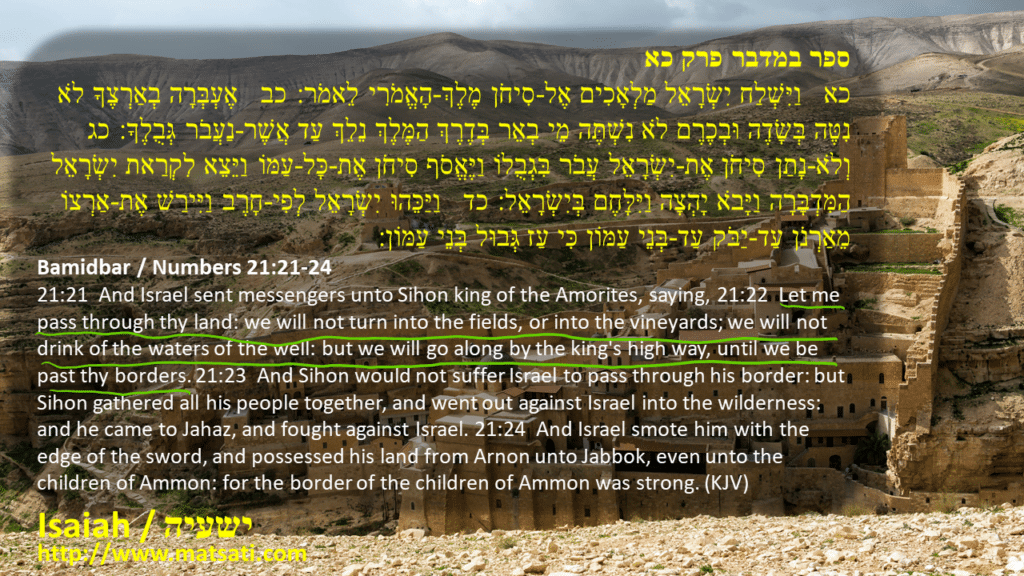
ספר במדבר פרק כא
כא וַיִּשְׁלַח יִשְֹרָאֵל מַלְאָכִים אֶל-סִיחֹן מֶלֶךְ-הָאֱמֹרִי לֵאמֹר: כב אֶעְבְּרָה בְאַרְצֶךָ לֹא נִטֶּה בְּשָֹדֶה וּבְכֶרֶם לֹא נִשְׁתֶּה מֵי בְאֵר בְּדֶרֶךְ הַמֶּלֶךְ נֵלֵךְ עַד אֲשֶׁר-נַעֲבֹר גְּבֻלֶךָ: כג וְלֹא-נָתַן סִיחֹן אֶת-יִשְֹרָאֵל עֲבֹר בִּגְבֻלוֹ וַיֶּאֱסֹף סִיחֹן אֶת-כָּל-עַמּוֹ וַיֵּצֵא לִקְרַאת יִשְֹרָאֵל הַמִּדְבָּרָה וַיָּבֹא יָהְצָה וַיִּלָּחֶם בְּיִשְֹרָאֵל: כד וַיַּכֵּהוּ יִשְֹרָאֵל לְפִי-חָרֶב וַיִּירַשׁ אֶת-אַרְצוֹ מֵאַרְנֹן עַד-יַבֹּק עַד-בְּנֵי עַמּוֹן כִּי עַז גְּבוּל בְּנֵי עַמּוֹן:
Bamidbar / Numbers 21:21-24
21:21 And Israel sent messengers unto Sihon king of the Amorites, saying, 21:22 Let me pass through thy land: we will not turn into the fields, or into the vineyards; we will not drink of the waters of the well: but we will go along by the king’s high way, until we be past thy borders. 21:23 And Sihon would not suffer Israel to pass through his border: but Sihon gathered all his people together, and went out against Israel into the wilderness: and he came to Jahaz, and fought against Israel. 21:24 And Israel smote him with the edge of the sword, and possessed his land from Arnon unto Jabbok, even unto the children of Ammon: for the border of the children of Ammon was strong. (KJV)
Here Israel offered to peacefully pass through their land. The king however was not interested in peace. In addition, Midrash Tanchuma makes reference to Tehillim / Psalms 37:3 Rest in the LORD, and wait patiently for him: fret not thyself because of him who prospereth in his way, because of the man who bringeth wicked devices to pass. (KJV) and also in Tehillim / Psalms 34:14 David writes, 34:14 Depart from evil, and do good; seek peace, and pursue it. (KJV) In fact, the Torah provides various commands that are related to this very topic of pursuing peace as it says, “If a bird’s nest happened to be before you on the road…” (Devarim / Deuteronomy 22:6). “If you see the donkey of someone you hate…” (Shemot / Exodus 23:4). “If you see the donkey…” (Devarim / Deuteronomy 23:4). “When you reap your harvest…” (Devarim / Deuteronomy 24:20). “When you gather your grapes…” (Devarim / Deuteronomy 24:21). “When you come into the vineyard of your fellow…” (Devarim / Deuteronomy 23:25). Each of these commands speak to the obligation of God’s people to be kind, to seek mercy, and to pursue the peace of your neighbor! Notice how significant and important this topic is in relation to the NT. Note also the approach of modern theologies which fail to recognize the significance of the Torah in the lives of God’s people! The idea of seeking peace is deeply rooted in the lives of God’s people as Yeshua taught us to do these things according to the Torah, because he was teaching Torah during his ministry. The Rabbinic literature continues according to the Talmud saying the following:
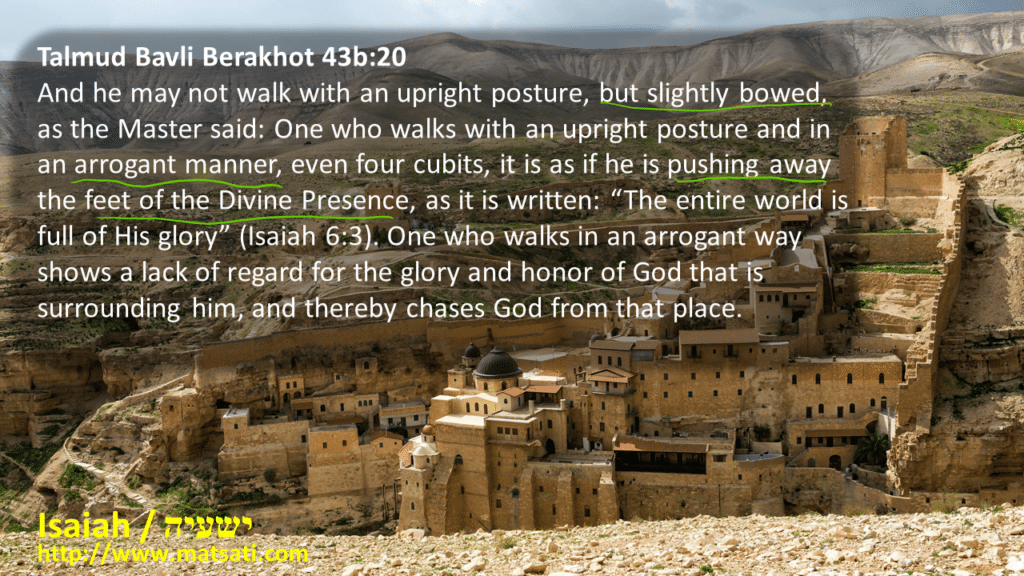
Talmud Bavli Berakhot 43b:20
And he may not walk with an upright posture, but slightly bowed, as the Master said: One who walks with an upright posture and in an arrogant manner, even four cubits, it is as if he is pushing away the feet of the Divine Presence, as it is written: “The entire world is full of His glory” (Isaiah 6:3). One who walks in an arrogant way shows a lack of regard for the glory and honor of God that is surrounding him, and thereby chases God from that place.
Note that the rabbis discuss the issue of pride, and how one is to behave one’s self, when walking to do so with a slightly bowed posture. Having pride in one’s life, this causes the Divine presence to leave. What this suggests is that God’s presence is all around us. The Torah reveals to us how the Lord God desires to dwell in our midst. Note something that Yeshua says according to John 14:23, “Anyone who loves me will obey my teaching. My Father will love them, and we will come to them and make our home with them”. (NIV) Here Yeshua is teaching his disciples and us the importance of the Torat (תורת, instruction) of God, as keeping and obeying his teachings. This is important, as part of the Shema, we are to love the Lord our God, and in order to have communion with Him, to have His presence in our lives, we read and study God’s word so as to teach us how to have a close fellowship with God. Pride is what drives the presence of God away from us, as opposed to humility, humbleness of heart. The most beautiful thing that happens to us when we faithfully obey His commands is that the Father and the Son come and dwell with us. We can enjoy the presence of God at all times, and this happens especially when we honor the Word of God in our lives and teach others to do the same through pursuing peace, life, and truth in the Messiah Yeshua. These fundamental teachings that are found in the Torah are taught according to the Apostolic Writings (NT). This is a Torah centric principle, the Lord is present in our midst, and when we pray in truth, with peace, and righteousness, He will reveal to us greater things by His Spirit that dwells within. It is in this way that the Lord God Almighty dwells in our midst and leads and guides us in all our ways. This is what the people of Israel had lost, what they had forgotten, and what they did not know because they turned from the ways of God and from His holy Word.
Isaiah continues describing his vision in the following way according to Isaiah 6:4, ד וְזָעוּ אִלְוָת סִיפֵי הֵיכְלָא מִקָל מִלוּלָא וּבֵית מַקדְשָא אִתמְלִי אְמִיטְתָא׃ 6:4 And the posts of the threshold of the temple moved at the voice of him that cried, and the house of the sanctuary was filled with cloudy darkness. ה וַאְמַרִית וָי לִי אְרֵי חַבִית אְרֵי גְבַר חַייָב לְאֹוכָחָא אְנָא וּבגֹו עַמָא דִמגָעַל בְחֹובִין אְנָא יָתֵיב אְרֵי יָת יְקַר שְכִינַת מַלַך עָלְמַיָא יוי ”צְבָאֹות“ חְזַאָה עֵינָי׃ 6:5 Then said I, Woe is me, for I have sinned, for I am a guilty man to reprove, and I dwell in the midst of a people polluted with sin: for mine eyes have seen the glory of the Shekinah of the King of the worlds, the Lord of hosts. ו וְאִשתְוֵי לְוָתִי חַד מִן שַמָשַיָא וּבפוּמֵיה מַמלַל דְקַבֵיל מִן קֳדָם דִשכִינְתֵיה עַל כוּרסֵי יְקָרָא בִשמֵי מְרֹומָא עֵיל מִן מַדבְחָא׃ 6:6 Then flew one of the ministers unto me, and in his mouth was a word, which he received from the Shekinah of Him who sat upon the throne of glory in the highest heavens, above the altar. (TgJ) God’s glory is so great and powerful that at the sound of the Word of praise the foundations of the temple in heaven shook and moved. We think about this that these are things not made by human hands. If we draw a parallel to the temple mount, note the weight of some of the cornerstones supporting the temple mount are estimated to weigh 50 tons. Imagine this foundation shaking, whereas in heaven, the foundations upon which God has established are much more secure, and yet they shake at the voice of His Word! By this magnificent display of power, Isaiah realizes his own sinfulness and unworthiness before a holy God. Isaiah declares that he has seen the glory of the Shekinah of the King of the worlds, the Lord of hosts, and says that he is a man of sin, living in the midst of a people polluted with sin. The Midrash on Deuteronomy (Devarim Rabbah) has the following to say concerning these things.
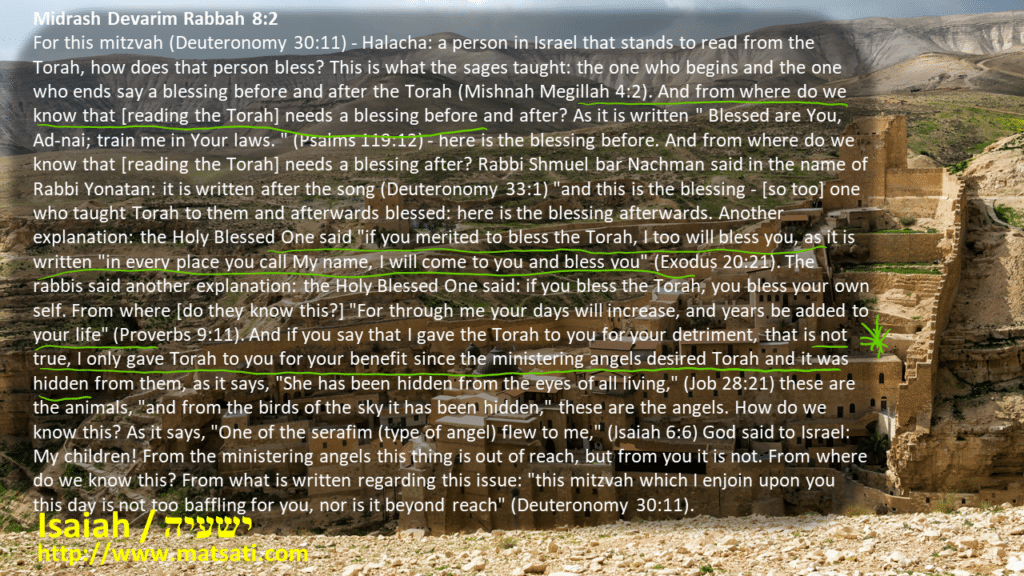
Midrash Devarim Rabbah 8:2
For this mitzvah (Deuteronomy 30:11) – Halacha: a person in Israel that stands to read from the Torah, how does that person bless? This is what the sages taught: the one who begins and the one who ends say a blessing before and after the Torah (Mishnah Megillah 4:2). And from where do we know that [reading the Torah] needs a blessing before and after? As it is written ” Blessed are You, Ad-nai; train me in Your laws. ” (Psalms 119:12) – here is the blessing before. And from where do we know that [reading the Torah] needs a blessing after? Rabbi Shmuel bar Nachman said in the name of Rabbi Yonatan: it is written after the song (Deuteronomy 33:1) “and this is the blessing – [so too] one who taught Torah to them and afterwards blessed: here is the blessing afterwards. Another explanation: the Holy Blessed One said “if you merited to bless the Torah, I too will bless you, as it is written “in every place you call My name, I will come to you and bless you” (Exodus 20:21). The rabbis said another explanation: the Holy Blessed One said: if you bless the Torah, you bless your own self. From where [do they know this?] “For through me your days will increase, and years be added to your life” (Proverbs 9:11). And if you say that I gave the Torah to you for your detriment, that is not true, I only gave Torah to you for your benefit since the ministering angels desired Torah and it was hidden from them, as it says, “She has been hidden from the eyes of all living,” (Job 28:21) these are the animals, “and from the birds of the sky it has been hidden,” these are the angels. How do we know this? As it says, “One of the serafim (type of angel) flew to me,” (Isaiah 6:6) God said to Israel: My children! From the ministering angels this thing is out of reach, but from you it is not. From where do we know this? From what is written regarding this issue: “this mitzvah which I enjoin upon you this day is not too baffling for you, nor is it beyond reach” (Deuteronomy 30:11).
The rabbinic discussion according to the Midrash is concerning the reading of the Torah and the blessings that one recites before and afterwards in the synagogue service. The source texts from the Scriptures for the beginning and ending blessings are found in Tehillim / Psalms 119:12 (for beginning) and Devarim / Deuteronomy 33:1 (for ending). Blessing the Lord God in word and in deed the Torah tells us the following according to Shemot / Exodus 20:24 (20:21 in Masoretic Text).
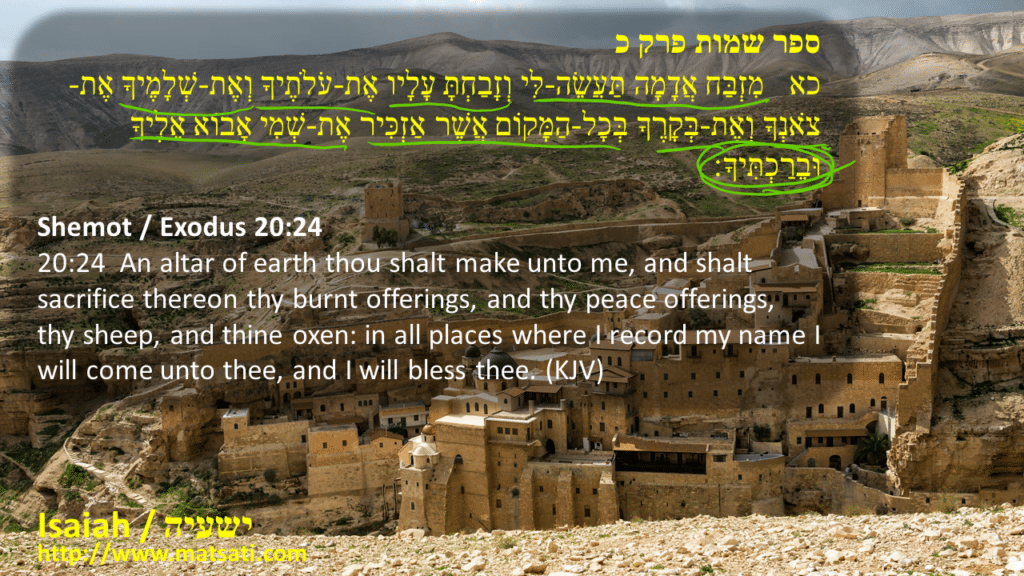
ספר שמות פרק כ
כא מִזְבַּח אֲדָמָה תַּעֲשֶֹה-לִּי וְזָבַחְתָּ עָלָיו אֶת-עֹלֹתֶיךָ וְאֶת-שְׁלָמֶיךָ אֶת-צֹאנְךָ וְאֶת-בְּקָרֶךָ בְּכָל-הַמָּקוֹם אֲשֶׁר אַזְכִּיר אֶת-שְׁמִי אָבוֹא אֵלֶיךָ וּבֵרַכְתִּיךָ:
Shemot / Exodus 20:24
20:24 An altar of earth thou shalt make unto me, and shalt sacrifice thereon thy burnt offerings, and thy peace offerings, thy sheep, and thine oxen: in all places where I record my name I will come unto thee, and I will bless thee. (KJV)
Note how this statement of בְּכָל-הַמָּקוֹם אֲשֶׁר אַזְכִּיר אֶת-שְׁמִי אָבוֹא אֵלֶיךָ וּבֵרַכְתִּיךָ “in all places that my name is remembered, I will come and bless you” is coupled to the covenant, sacrifice, the altar, and prayer, an standing in God’s presence, are all in the context of this one statement. Isaiah 6:7 continues saying according to the Targum, ז וְסַדַר בְפוּמִי וַאְמַר הָא שַוִיתִי פִתגָמֵי נְבוּאְתִי בְפוּמָך וְיִעדֹון חֹובָך וּחטָאָך יִתכַפְרוּן׃ 6:7 And he placed it in my mouth, and said, Behold, I have put the words of my prophecies in thy mouth, and thy iniquities are put away, and thy sins are expiated. (TgJ) The blessing of having God’s word is so great that we are told God gave us the Torah and not his angels, illustrating the significance of God’s word in our lives. Note how Yeshua taught Torah when he said according to Matthew 18:20 “For where two or three have gathered together in My name, I am there in their midst.” (KJV) This Torah concept is very important as being a part of God’s people, we know that we are always in the presence of the Lord God King of the universe. And when we follow and apply God’s teachings through Yeshua the Messiah, he is there with us too. All of these concepts draw us back to the situation that is going on in Isaiah’s day, the people have turned from seeking the Lord, from His holy and righteous words (Romans 7:12) and as a result, they fall away into rampant sin and rebellion, and the presence of God departs from them. Notice how this is all about having a relationship with God! This isn’t simply a matter of man obeying the commands of God by route to earn favor. The Torah speaks of pursuing peace, of loving God, of loving our neighbor, of doing good to others, of speaking about the Lord everywhere we go, and seeking mercy and grace towards others and from the Lord Himself for the forgiveness of sins! Notice how all of these things are expounded upon in the NT text, which are source texted from the Torah, the Prophets, and the Writings (the תנך Tanakh). The point of emphasis that is being made here is how the Torah is to be an integral part of our lives as the children of God, and not something that has been done away with or passed away! This statement that “Jesus did it for us so we don’t have to” is not correct and is birthed out of the idea that a man earns his salvation under the Torah, which is not what is being taught according to the Scriptures!
Isaiah continues saying according to the Targum translation, ח וּשמַעִית יָת קָל מֵימְרָא דַיוי דְאָמַר יָת מַן אַשלַח לְאִתנַבָאָה וּמַן יֵיזֵיל לְאַלָפָא וַאְמַרִית הָאְנָא שְלַח יָתִי׃ 6:8 And I heard the voice of the Word of the Lord, which said, Whom shall I send to prophesy? and who will go to teach? Then said I, Here am I, send me. ט וַאְמַר אִיזֵיל וְתֵימַר לְעַמָא הָדֵין דְשָמְעִין מִשמָע וְלָא מִסתַכְלִין וְחָזַן מִחזָא וְלָא יָדְעִין׃ 6:9 And He said, Go, and tell this people, who are diligently hearing, but understand not, and see diligently, but know not. י טַפֵיש לִבֵיה דְעַמָא הָדֵין וְאוּדנֹוהִי יַקַר וְעֵינֹוהִי טַמטֵים דִלמָא יִחזֹון בְעֵינֵיהֹון וּבאוּדנְהֹון יִשמְעוּן וּבלִיבְהֹון יִסתַכְלוּן וִיתוּבוּן וְיִשתְבֵיק לְהֹון׃ 6:10 Make the heart of this people fat, and make their ears heavy, and darken their eyes; lest they see with their eyes, and hear with their ears, and understand with their heart, and repent, and it shall be forgiven them. (TgJ) The original Isaiah text states the following:
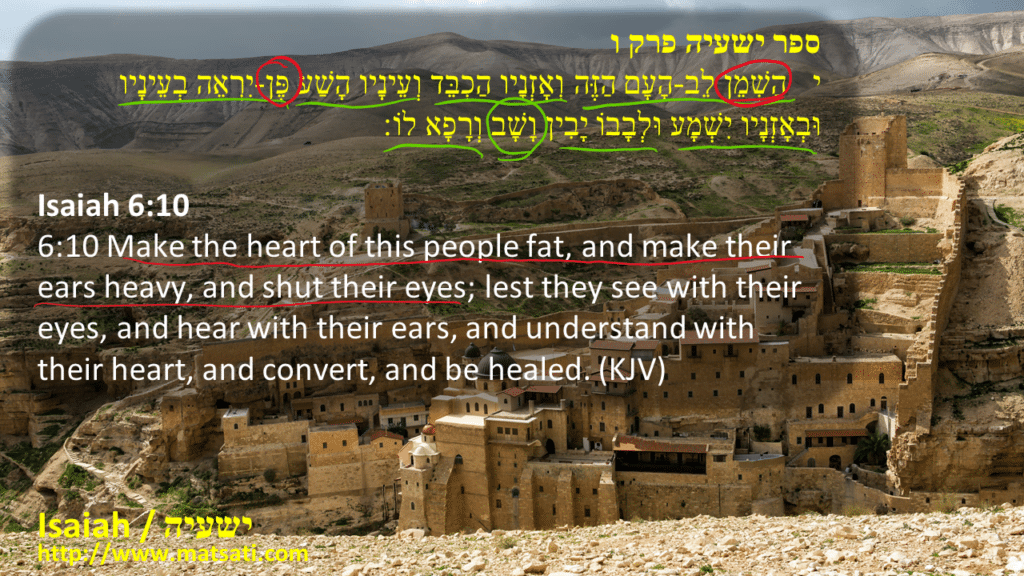
ספר ישעיה פרק ו
י הַשְׁמֵן לֵב-הָעָם הַזֶּה וְאָזְנָיו הַכְבֵּד וְעֵינָיו הָשַׁע פֶּן-יִרְאֶה בְעֵינָיו וּבְאָזְנָיו יִשְׁמָע וּלְבָבוֹ יָבִין וָשָׁב וְרָפָא לוֹ:
Isaiah 6:10
6:10 Make the heart of this people fat, and make their ears heavy, and shut their eyes; lest they see with their eyes, and hear with their ears, and understand with their heart, and convert, and be healed. (KJV)
Here the word הַשְׁמֵן “make fat” is not an infinitive like is found in Vayikra / Leviticus 5:4 לְהָרַ֣ע “to do evil.” The reason is due to the conjunction פֶּן “lest” demonstrates the ending of the first clause, where the words הָשַׁע “pasted over” and הַשְׁמֵן “made fat” are not infinitives as Isaiah is not being told to make their eyes and ears this way. These are imperative forms which indicate that Isaiah is to declare that their eyes and ears are pasted over (not able to see or hear) and their hearts are fat. Ibn Ezra states that “In Chaldee, this word שעה has the same meaning. Comp. Lev. 14:42, 43, and the Chaldæan translation. The imperative Hiphil ought to be הֶשֶׁע like הֶרֶף, but the guttural letter ע causes the alteration; the form הָשַׁע can also be derived from a verb (שעע)” where שעע means “seal over, paste over” etc. The point is this is the way the people already are, this is not something that God is doing to the people. People who walk in their pride cannot blame anyone else, especially they cannot blame God for the way that they are. Each person will give an account for his or her actions before God! Ein Yaakov on Rosh HaShanah comments on Isaiah 6:10 in the following way.
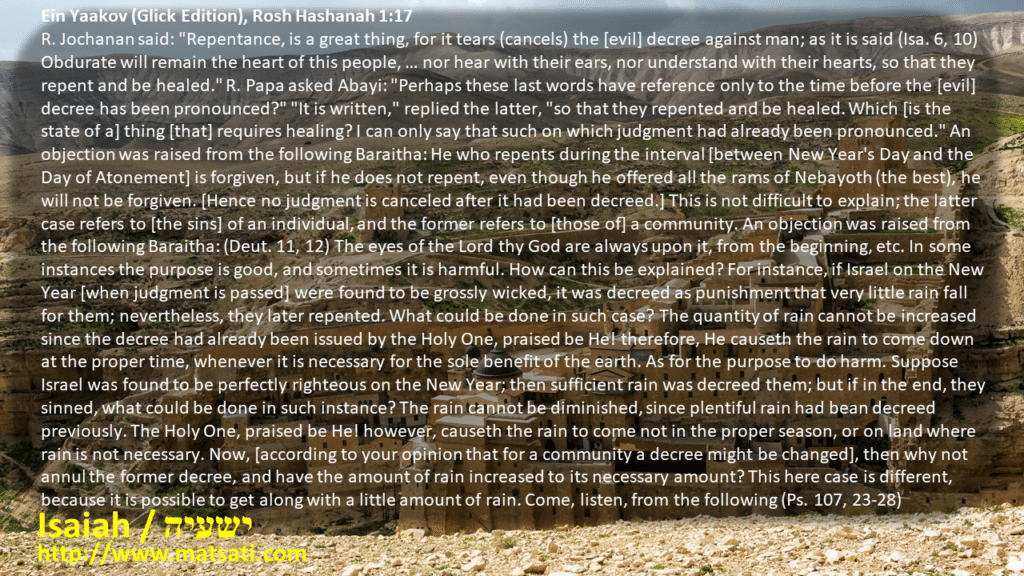
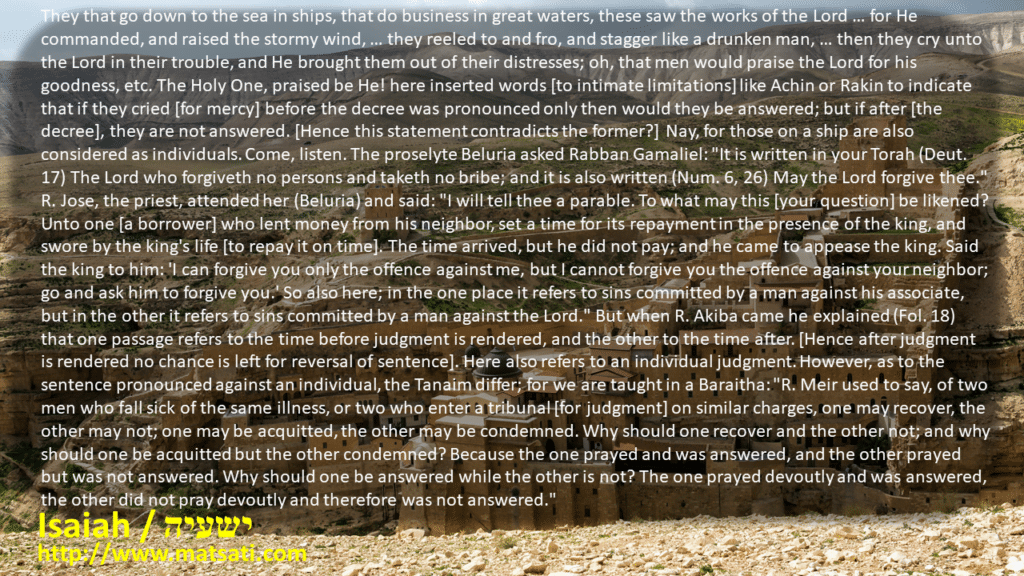
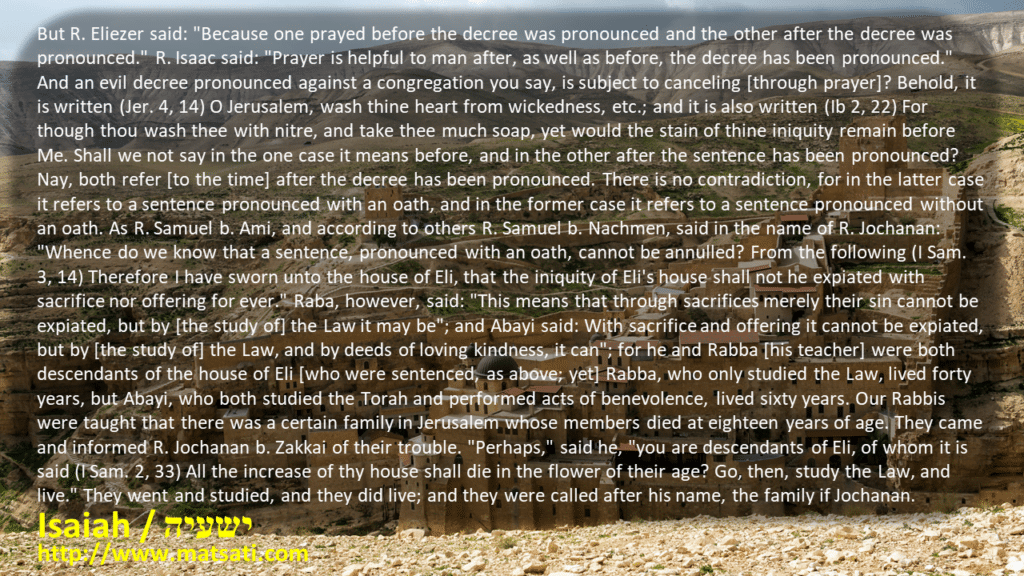
Ein Yaakov (Glick Edition), Rosh Hashanah 1:17
R. Jochanan said: “Repentance, is a great thing, for it tears (cancels) the [evil] decree against man; as it is said (Isa. 6, 10) Obdurate will remain the heart of this people, … nor hear with their ears, nor understand with their hearts, so that they repent and be healed.” R. Papa asked Abayi: “Perhaps these last words have reference only to the time before the [evil] decree has been pronounced?” “It is written,” replied the latter, “so that they repented and be healed. Which [is the state of a] thing [that] requires healing? I can only say that such on which judgment had already been pronounced.” An objection was raised from the following Baraitha: He who repents during the interval [between New Year’s Day and the Day of Atonement] is forgiven, but if he does not repent, even though he offered all the rams of Nebayoth (the best), he will not be forgiven. [Hence no judgment is canceled after it had been decreed.] This is not difficult to explain; the latter case refers to [the sins] of an individual, and the former refers to [those of] a community. An objection was raised from the following Baraitha: (Deut. 11, 12) The eyes of the Lord thy God are always upon it, from the beginning, etc. In some instances the purpose is good, and sometimes it is harmful. How can this be explained? For instance, if Israel on the New Year [when judgment is passed] were found to be grossly wicked, it was decreed as punishment that very little rain fall for them; nevertheless, they later repented. What could be done in such case? The quantity of rain cannot be increased since the decree had already been issued by the Holy One, praised be He! therefore, He causeth the rain to come down at the proper time, whenever it is necessary for the sole benefit of the earth. As for the purpose to do harm. Suppose Israel was found to be perfectly righteous on the New Year; then sufficient rain was decreed them; but if in the end, they sinned, what could be done in such instance? The rain cannot be diminished, since plentiful rain had bean decreed previously. The Holy One, praised be He! however, causeth the rain to come not in the proper season, or on land where rain is not necessary. Now, [according to your opinion that for a community a decree might be changed], then why not annul the former decree, and have the amount of rain increased to its necessary amount? This here case is different, because it is possible to get along with a little amount of rain. Come, listen, from the following (Ps. 107, 23-28) They that go down to the sea in ships, that do business in great waters, these saw the works of the Lord … for He commanded, and raised the stormy wind, … they reeled to and fro, and stagger like a drunken man, … then they cry unto the Lord in their trouble, and He brought them out of their distresses; oh, that men would praise the Lord for his goodness, etc. The Holy One, praised be He! here inserted words [to intimate limitations] like Achin or Rakin to indicate that if they cried [for mercy] before the decree was pronounced only then would they be answered; but if after [the decree], they are not answered. [Hence this statement contradicts the former?] Nay, for those on a ship are also considered as individuals. Come, listen. The proselyte Beluria asked Rabban Gamaliel: “It is written in your Torah (Deut. 17) The Lord who forgiveth no persons and taketh no bribe; and it is also written (Num. 6, 26) May the Lord forgive thee.” R. Jose, the priest, attended her (Beluria) and said: “I will tell thee a parable. To what may this [your question] be likened? Unto one [a borrower] who lent money from his neighbor, set a time for its repayment in the presence of the king, and swore by the king’s life [to repay it on time]. The time arrived, but he did not pay; and he came to appease the king. Said the king to him: ‘I can forgive you only the offence against me, but I cannot forgive you the offence against your neighbor; go and ask him to forgive you.’ So also here; in the one place it refers to sins committed by a man against his associate, but in the other it refers to sins committed by a man against the Lord.” But when R. Akiba came he explained (Fol. 18) that one passage refers to the time before judgment is rendered, and the other to the time after. [Hence after judgment is rendered no chance is left for reversal of sentence]. Here also refers to an individual judgment. However, as to the sentence pronounced against an individual, the Tanaim differ; for we are taught in a Baraitha: “R. Meir used to say, of two men who fall sick of the same illness, or two who enter a tribunal [for judgment] on similar charges, one may recover, the other may not; one may be acquitted, the other may be condemned. Why should one recover and the other not; and why should one be acquitted but the other condemned? Because the one prayed and was answered, and the other prayed but was not answered. Why should one be answered while the other is not? The one prayed devoutly and was answered, the other did not pray devoutly and therefore was not answered.” But R. Eliezer said: “Because one prayed before the decree was pronounced and the other after the decree was pronounced.” R. Isaac said: “Prayer is helpful to man after, as well as before, the decree has been pronounced.” And an evil decree pronounced against a congregation you say, is subject to canceling [through prayer]? Behold, it is written (Jer. 4, 14) O Jerusalem, wash thine heart from wickedness, etc.; and it is also written (Ib 2, 22) For though thou wash thee with nitre, and take thee much soap, yet would the stain of thine iniquity remain before Me. Shall we not say in the one case it means before, and in the other after the sentence has been pronounced? Nay, both refer [to the time] after the decree has been pronounced. There is no contradiction, for in the latter case it refers to a sentence pronounced with an oath, and in the former case it refers to a sentence pronounced without an oath. As R. Samuel b. Ami, and according to others R. Samuel b. Nachmen, said in the name of R. Jochanan: “Whence do we know that a sentence, pronounced with an oath, cannot be annulled? From the following (I Sam. 3, 14) Therefore I have sworn unto the house of Eli, that the iniquity of Eli’s house shall not he expiated with sacrifice nor offering for ever.” Raba, however, said: “This means that through sacrifices merely their sin cannot be expiated, but by [the study of] the Law it may be”; and Abayi said: With sacrifice and offering it cannot be expiated, but by [the study of] the Law, and by deeds of loving kindness, it can”; for he and Rabba [his teacher] were both descendants of the house of Eli [who were sentenced, as above; yet] Rabba, who only studied the Law, lived forty years, but Abayi, who both studied the Torah and performed acts of benevolence, lived sixty years. Our Rabbis were taught that there was a certain family in Jerusalem whose members died at eighteen years of age. They came and informed R. Jochanan b. Zakkai of their trouble. “Perhaps,” said he, “you are descendants of Eli, of whom it is said (I Sam. 2, 33) All the increase of thy house shall die in the flower of their age? Go, then, study the Law, and live.” They went and studied, and they did live; and they were called after his name, the family if Jochanan.
There are a number of points that are being made by Ein Yaakov. He begins by reference to Isaiah 6:10 and speaks to the inability to see or hear as being connected to repentance and God giving the people opportunity to repent and be healed. Repentance staves off judgement. We notice that he says “if he does not repent, even though he offered all the rams of Nebayoth (the best), he will not be forgiven.” Note that this supports the idea that sacrifice was not a means for man earning his salvation. One had to come to God by faith, for without faith there is no salvation, and the same could be said of repentance and its importance in our lives. This is supported by the statement saying, “The proselyte Beluria asked Rabban Gamaliel: ‘It is written in your Torah (Deut. 17) The Lord who forgiveth no persons and taketh no bribe; and it is also written (Num. 6, 26) May the Lord forgive thee.’ In addition, note the comments on prayer, ‘Why should one recover and the other not; and why should one be acquitted but the other condemned? Because the one prayed and was answered, and the other prayed but was not answered. Why should one be answered while the other is not? The one prayed devoutly and was answered, the other did not pray devoutly and therefore was not answered.’ But R. Eliezer said: ‘Because one prayed before the decree was pronounced and the other after the decree was pronounced.’ R. Isaac said: ‘Prayer is helpful to man after, as well as before, the decree has been pronounced.'” Note how it isn’t the performance of a command but a matter of kavanah, the proper intention, from a pure heart. This is the point of serving and loving God, not for personal gain, but for relationship with the Lord and communion with the Holy One of Israel! We note that those theologies that say man earned his salvation under the Torah are saying God designed the commands so that man could sin by obeying them due to doing so for personal gain, a form of covetousness! The conclusion is “From the following (I Sam. 3, 14) Therefore I have sworn unto the house of Eli, that the iniquity of Eli’s house shall not he expiated with sacrifice nor offering for ever. Raba, however, said: “This means that through sacrifices merely their sin cannot be expiated, but by [the study of] the Law it may be; and Abayi said: With sacrifice and offering it cannot be expiated, but by [the study of] the Law, and by deeds of loving kindness, it can;” The point is that through studying God’s Word, we draw near to the Lord, we humble our hearts, and seek the Lord’s presence in our lives. This is why sacrifice alone does not make atonement. One’s life must be changed, there must be evidence for the fruit of the Spirit, as illustrated in deeds of loving kindness towards others. These things speak of the power of God working in the lives of His people, those who would humble themselves and seek the Lord according to His holy Word!
Isaiah continues saying according to the Targum translation, יא וַאְמַרִית עַד אִימַתִי יוי וַאְמַר עַד דִיצַדְייָן קִרוַיָא מִבְלִי יָתִיב וּבָתַיָא מִבְלִי אְנָשָא וְאַרעָא תִחרוּב וְתִצדֵי 6:11 Then said I, Lord, how long? And He answered, Until the cities be wasted without an inhabitant, and the houses without man, and the land be laid desolate and wasted. יב וִירַחֵיק יוי יָת בְנֵי אְנָשָא וְתִסגֵי צַדיוּתָא בְגַוַה דְאַרעָא׃ 6:12 And the Lord have removed the children of men far away, and the desolation be great in the midst of the land. יג וְיִשתַאְרוּן בַה חַד מִן עַסרָא צדיקיא וִיתוּבוּן וִיהֹון לְצָרָבָא כְבוּטמָא וּכבַלוּטָא דִבמִיתַר טַרפֵיהֹון דָמַן לְיַבִישִין וְעַד כְעַן אִינוּן רַטִיבִין לְקַייָמָא מִינְהֹון זַרעָא כֵין גָלְוָותָא דְיִשׂרָאֵל יִתכַנשוּן וִיתוּבוּן לַאְרַעהֹון אְרֵי זַרעָא דְקוּדשָא נִצבָתְהֹון׃ 6:13 And there shall be left in it righteous men, one out of ten: they shall return, and they shall be for poverty, as the terebynth and the oak when their leaves fall, they are like to dry trees, nevertheless, they are moist to raise up seed from them; thus the captivity of Israel shall be gathered, and shall return to their land, for the seed which is holy is their plantation. (TgJ) It is interesting how the Targum writes that those men who remain in the Land of Israel are righteous men and how these righteous men will raise children who know the Lord. The Talmud discusses the following concerning Isaiah 6:13 in the following way.
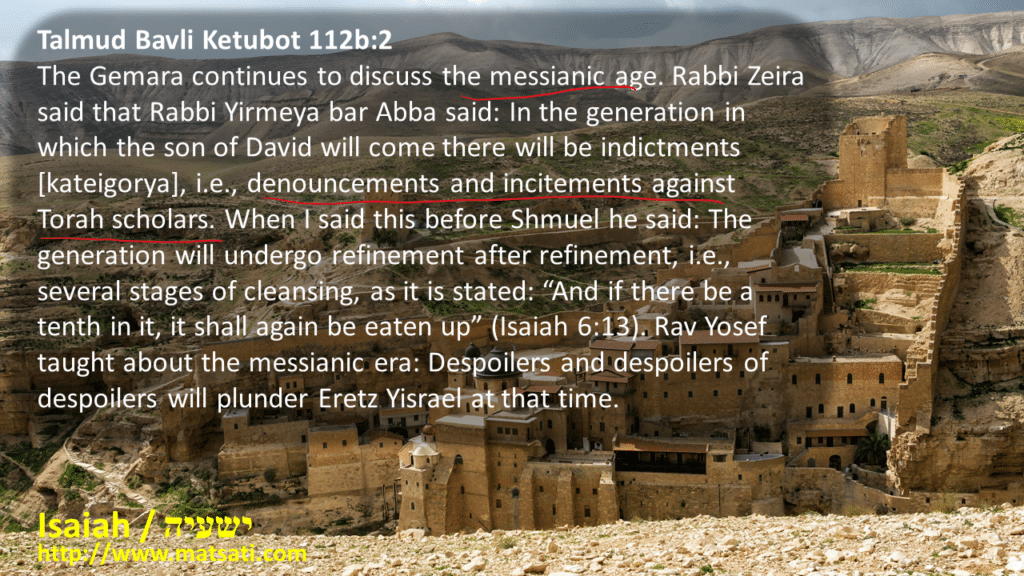
Talmud Bavli Ketubot 112b:2
The Gemara continues to discuss the messianic age. Rabbi Zeira said that Rabbi Yirmeya bar Abba said: In the generation in which the son of David will come there will be indictments [kateigorya], i.e., denouncements and incitements against Torah scholars. When I said this before Shmuel he said: The generation will undergo refinement after refinement, i.e., several stages of cleansing, as it is stated: “And if there be a tenth in it, it shall again be eaten up” (Isaiah 6:13). Rav Yosef taught about the messianic era: Despoilers and despoilers of despoilers will plunder Eretz Yisrael at that time.
The rabbis speak of the Messianic Age and a time when people will denounce Torah Scholars. And because of this, the generation of people will undergo refinement, what they call several stages of cleansing. This seems different from Judaism’s view of the messianic age: “One of the most important aspects of the messianic age is the Redemption of God’s people and the promise of the ingathering of the exiles from the Diaspora, with all Jews settling in their tribal portion of the Holy Land.” It is important to understand what Isaiah has been speaking to us about, that everything we have is a gift from God. The people in Isaiah’s time were proud, selfish, and believed they deserved to be comfortable and live in unrepentant sin, rejecting God’s ways and seeking their own ways, gratifications, and lusts, without consequence. This is how selfishness works, it produces an artificial sense of entitlement. When something goes wrong, the reaction is shock, bitterness, anger, and the belief that one’s rights have been violated. This is exactly what we are seeing taking place today in our culture! The Word of God is timeless and has application always! The point is that there are many things that we take for granted today. Good health, food on the table, a roof over our heads, relationships with others, and all of life’s comforts according to our modern western culture. The reason we take these things for granted is we receive these things day by day, week after week, and year after year. So, it is possible to think of these things which are a blessing of God as a privilege as opposed to being thankful for all that we have. Isaiah is providing us with a reality check that we must realize, recognize, and admit that all we have is due to God’s blessing, and how He is the one from whom we receive all things!
